
First Generation, Second to None SPIRIT SUMMER/FALL 2022 A MAGAZINE FOR THE GEORGE MASON UNIVERSITY COMMUNITY BLAZING A TRAIL | OPENING DOORS | MASON VIRGINIA PROMISE
Senior and first-generation student Galilea Sejas is double majoring in criminology, law and society and sociology. This academic year she is living on campus as a resident assistant and working in the Office of University Branding as a social media student assistant. Photo by Evan Cantwell
Mason coins were one of the commemorative items created to celebrate our 50th Anniversary.

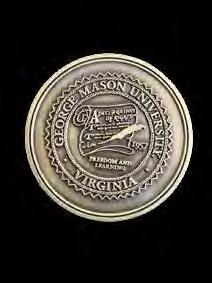

About the Cover
PHOTO BY SIERRA GUARD
More than 150 members of the Mason Nation took part in the City of Fairfax Independence Day Parade on Monday, July 4, 2022, and Mason won first place for its float.
Connect with George Mason University @georgemason @georgemasonu @georgemasonu @georgemasonuniversity #MasonNation gmu.edu
Blazing a Trail
One in three Mason students is the first in their families to attain a college degree. These first-generation students surmount countless obstacles in pursuit of their degrees, and Mason is there for them.



Opening Doors
For 35 years, Mason’s Early Identification Program has been helping Northern Virginia middle and high school students prepare for college careers.
Building
of
18
24
30 That’s a Promise
on the university’s successful ADVANCE Program, Mason is forging relationships with state community college systems and creating accessible pathways to a four-year degree for Virginians as part
the Mason Virginia Promise initiative. DEPARTMENTS 2 FIRST WORDS 3 FR OM OUR READERS 4 @M ASON 4 3 P ATRIOT PROFILE 4 5 CLASS NOTES 46 From the Alumni Association President AL UMNI PROFILES 44 Amy Schott, MEd Education Leadership ’06 47 Kwabena Konadu, BS Electrical Engineering ’00, MS Telecommunications ’02 49 India Adams-Jacobs, BS Public Administration ’12 FEATURES Summer/Fall 2022 MASON SPIRIT | 1 MORE ON THE WEB When you see this graphic, follow it to the magazine’s website for more: spirit.gmu.edu.
PHOTO BY RON AIRA
CREATING PATHWAYS
As we embark on another academic year, I wanted to highlight some of the fabulous work being done by our faculty, staff, and students.
Our Mason Virginia Promise (MVP) initiative is ready to provide every Virginia resident a pathway to a bachelor’s degree or help starting their own business. In short, show us your Point A, and MVP will help you reach your Point B.
To achieve this, we’re creating new pathways to success and establishing partnerships across the state. Building on the success of Mason’s ADVANCE Program with Northern Virginia Community College, Mason is launching similar partnerships— called Mason Academies—with community colleges around the state. The university is also increasing financial aid for the more than 3,000 transfer students annually in need.
For budding entrepreneurs, Mason Enterprise offers a network of free resources and training through out Virginia, including 27 Small Business Development Centers. Last year, Mason helped more than 11,000 small business owners, with the majority of businesses being women-owned, minority-owned, and veteran-owned.
An important onramp to MVP is Mason’s Early Identification Program (EIP), which partners with North ern Virginia schools to recruit middle school students aiming to become the first member of their family to earn a four-year degree.
Providing year-round services, EIP guides students and families through numerous pre-college steps and unfamiliar processes, and offers scholarships and grants, all to break down barriers to higher education.
Of the 112 graduates in EIP this spring, 95 have been admitted to college. Forty-two will attend Mason. Another 35 will attend universities around the commonwealth.
Speaking at a Board of Visitors meeting, EIP student Samantha Dawkins cited the “guidance, attention, and compassion” she has received at Mason. Samantha will graduate with an environmental and sustain ability studies degree and has a Mason-funded grant to research solutions to local food insecurity.
“I plan to serve my community just as my community served me,” she said.
Michele Adjei-Fah, whom I met when Mason announced our first Mason Academy partnership with Germanna Community College, was drawn to Mason not only for our community health program but also because “everyone is welcome here.”
She’s right. Everyone is welcome at Mason. And that’s a promise we intend to keep.
MVP programs help develop a prepared, diverse workforce for our region and state, graduates whose grit and determination shine through on our campuses and in our communities. Through Mason, they arrive at Point B.
Gregory Washington
President, George Mason University

Follow President Washington on Twitter at @gmupres and on Instagram at @presidentgregorywashington.
A MAGAZINE FOR THE GEORGE MASON UNIVERSITY COMMUNITY spirit.gmu.edu
MANAGING EDITOR
Colleen Kearney Rich, MFA ’95
ASSOCIATE EDITORS
Melanie Balog
Priyanka Champaneri, BA ’05, MFA ’10
EDITORIAL ASSISTANT
Madison Rudolf, BA ‘22
CONTRIBUTORS
Mariam Aburdeineh, BA ’13
Damian Cristodero
Mary Cunningham
John Hollis
Rebecca Kobayashi
Katie Maney
Anna Stolley Persky
Laura Powers
Anne Reynolds
Corey Jenkins Schaut, MPA ’07
Pam Shepherd
Preston Williams
DESIGN AND ILLUSTRATION
Claire Brandt
Joan Dall'Acqua
Jeeun Lee Namgoong
Michaela Reilly, BA ‘21
Azriel Towner, BFA ‘19
PHOTOGRAPHY AND MULTIMEDIA Ron Aira
Melissa Cannarozzi
Evan Cantwell, MA ’10
Sierra Guard, BFA ‘22
PRODUCTION MANAGER
Brian Edlinski
EDITORIAL BOARD
Stephanie Aaronson, BA ‘94
Deputy Vice President for Communications and Mason Media
Paul G. Allvin
Vice President for University Branding and Chief Brand Officer
Trishana E. Bowden
Vice President for Advancement and Alumni Relations
Kathleen Diemer
Associate Vice President for Advancement Relations
Robin Rose Parker
Assistant Vice President for Communications
Jennifer W. Robinson, JM ‘02
Associate Vice President for Alumni Relations
Mason Spirit is published three times a year by the Office of Advancement and Alumni Relations and the Office of University Branding. George Mason University is an equal opportunity employer that encourages diversity.
MASON SPIRIT
FIRST WORDS 2 | 50TH.GMU.EDU
Before GMU, There Was GMC
When my father was near his end, and I would go into the room where he was lying in bed, he would smile and say, “I’m still here!” He meant this to be humorous, so he drew out the words and said them with his eyes still shut and a little smile.
Well, I’m just guessing, but there are probably a few members of the classes of 1968 and 1969 still here. Me, for one.
I started at George Mason College [GMC] in 1965, after serving four years in the Air Force. It was tough getting back to studying, but eventually my grades were pretty good. It was a blessing for me when GMC had enough books in its new library to offer four-year degrees. That meant I didn’t have to transfer to another school after my first two years, but it also meant that the D I got in biology freshman year would count toward my BA in history.
Because I had taken a few courses while in the Air Force and attended summer school, I graduated in three years. I was in the first graduating class, 1968.
For other members of the class of 1968 who are “still here,” give the Mason Spirit magazine a shout-out!
Gordon MacPherson, BA History ’68
Don’t Forget SMSC
I am writing to inquire about why one of the greatest successes for Mason in its 50-year history—the colossal partnership established with [the] Smithsonian Institu tion that led to the creation of the Smithsonian-Mason School of Conservation (SMSC) located inside the Smith sonian Conservation Biology Institute (SCBI) in Front Royal, Virginia—was not prominently featured as part of the Mason Spirit 50th celebration edition.
The Smithsonian-Mason partnership is a success on an international scale, producing high-quality research, new teaching and learning opportunities, and numerous MS and PhD students in conservation biology, a group in which I am so grateful to be included. It has also boosted Mason in its rankings on many levels. This partnership was, in large part, made possible by the vision of Steve Monfort, PhD Environmental Science and Policy ’93, director of SCBI at the time and a Mason alum.
I was very eager in opening this edition of the maga zine to see photos of Mason researchers working with cheetahs, pandas, and seeing students in various coun tries around the world in the field, but I was instead quite deflated not to see any recognition of the partnership with Smithsonian.
First Class Ring?
On page 26 of the Spring 2022 issue, there is a photo of the 2002 official George Mason ring implying Art Carved provided the first class ring. This is incorrect as the first class ring was 1968, which I purchased and recently donated to Mason’s archives. In 2021, I met with Mason archivist Bob Vay and gave him my class ring and several other items from the GMU early years. He had never seen this ring and was very pleased to add it to the archives. I specifically chose a dark green stone as I was one of the students who originally proposed dark green and gold as the official GMU colors. At that time, Bob Vay also recorded an oral history of my experience at George Mason College from 1964 to 1977. I send you this infor mation as I would not want students or alumni reading the article to think that GMU began in 1972, as much occurred before that year that gave GMU the identity it has today.
Chris Powell, BS Biology ’73, MS ’77
As I have not read every line of every page, perhaps I have missed this—and do let me know if so.
Ryan Valdez, PhD ’15
Ryan, you are correct. We blew it. The Smithsonian partner ship was included in an earlier draft and fell out of the time line during a reorganization of Mason moments. We are huge fans of SMSC and have had an SMSC research story in almost every issue. In this issue, we feature some elephant research on page 4. Also, please know that the partnership is noted on our interactive timeline on 50th.gmu.edu where we had more room to include even more Mason moments. And the year isn’t over; there is still time for us to celebrate this unique partnership and its contributions to conserva tion efforts around the world.
Editor's Note: The global paper shortage has affected the Mason Spirit's production schedule and caused delays. As a result, our summer issue has become the summer/fall issue.

We want to hear from you.
Letters to the editor are welcomed.
Send correspondence to Colleen Kearney Rich, Managing Editor, Mason Spirit, 4400 University Drive, MS 2F7, Fairfax, Virginia 22030.
Or send an email to spirit@gmu.edu
Need to change your address or update contact information with us? Or prefer not to receive the magazine in the mail any longer? Just let us know via email at development@gmu.edu
FROM OUR READERS
Summer/Fall 2022 MASON SPIRIT | 3
Smithsonian-Mason Team Keeps Watch So Elephants Can Doze Off
Elephants only sleep three to four hours a night—and frequently wake during that time—so their sleep is a pre cious commodity.
That’s why George Mason University senior Eva Noroski spent a month assisting Mason alumna and Elephant Trails keeper Ashley Fortner, BA Integrative Studies ’17, at the Smithsonian’s National Zoo with research into how these massive mammals can get optimal sleep.

“Sleep is super important for the elephants because they don’t actually do a lot of it,” says Fortner. “Eva’s work is directly impacting how we take care of the elephants.”
Noroski accessed footage from the Smithsonian’s camera system to monitor the elephants from 5 p.m. until 5 a.m. and logged what she observed. In particular, she tracked Kamala, a female elephant who has arthritis, which causes her diffi culty lying down and getting up.
“I was trying to determine which elephants she sleeps best with, if she sleeps best by herself, or if there are any social dynamics that appear during the night that I can let the keepers know about,” says Noroski, who is an environmen tal science major and conservation studies minor. “That’s all really significant information because their sleep is important to their health, and if any mammal is losing sleep, they could become more susceptible to illness.”
Noroski’s findings will help zoo personnel create pairings that offer the best opportunity for sleep for each of their five elephants, says Fortner.
When Noroski wasn’t behind the computer, she could be found performing zookeeping tasks and shadowing Fort ner as she interacted with, trained, and completed wellness checks with the elephants.
Noroski, who grew up in Pittsburgh, Pennsylvania, says she chose Mason after researching schools with the best conser vation programs. Being at the Smithsonian-Mason School of Conservation (SMSC) with a small cohort of students and teachers has been one of the most rewarding parts of her time at Mason.
“I have made great connections, not only with people here at the zoo, but also with my [SMSC] teachers who are active conservationists,” Noroski says. “They’re super willing to help students find opportunities as well as connect us with other people—that’s a unique thing you can’t just get in any con servation program.”
—Mariam Aburdeineh, BA ’13
PHOTO BY SHELBY BURGESS
Mason student Eva Noroski (left) works with Mason alum Ashley Fortner to research elephant sleep patterns at the National Zoo.
@MASON 4 | 50TH.GMU.EDU
Opening Doors for People with Disabilities
George Mason University’s Class of 2022 graduates

Madison Essig (right), BA Integrative Studies ’22, and Charlotte Woodward (pictured below with mask), BA Sociology ’22, represent a select group of college graduates: Both women have Down syndrome, and when they received their degrees at EagleBank Arena, they became only the fifth and sixth individuals with Down syndrome in the United States to do so.
“I feel like I have done a lot to get to this point,” says Essig, who originally joined Mason through the Mason LIFE Program and went on to earn her bachelor’s degree in four years.

Essig has been very active on campus as a member of both Student Government and the Gamma Phi Beta sorority, in addition to working with the George Mason Democrats and attending Friday night Shabbat with Mason Hillel.
“I got so much out of it,” says Essig of her work with Stu dent Government. “I gained a lot of leadership skills [and showed] what I can do to make this campus more inclusive.”
Essig helped to pass “Madison’s Bill,” which expanded Student Government participation to Mason LIFE stu dents, allowing them to vote in student body elections and run for office. She recalls this work as being one of her proudest memories of her time at Mason.
Advocacy also drives Woodward. The straight-A stu dent earned her degree while working for the rights of people with disabilities, helping to pass legislation in
her home state, Virginia, that prevents disabil ity-based discrimination against people who need organ transplants. The recipient of a heart transplant in 2012, she has since worked to ensure that persons with disabilities can receive equal access to similar life-saving opportunities.
Through her work as a community outreach associate for the National Down Syndrome Soci ety (NDSS), she has met with legislators, taken part in advocacy events, served as editor in chief for an upcoming NDSS publication, and has become a popular presence on the society’s TikTok account.
“I am happy and proud to be graduating,” Woodward says, “but I will be happier and prouder when I see people with disabilities on the Mason staff and faculty, as well as graduating from Mason.”
Kandi Pickard, NDSS president and CEO, appreciates the progress that Essig and Woodward have achieved in their time at Mason. “This inclusion is leading us to where more individuals with Down syndrome are seeking college opportunities, or seeking employment opportunities,” she says. “I hope that more colleges and businesses will invest in having people with disabilities in their organizations.”
—Anne Reynolds
PHOTO BY RON AIRA
PHOTO BY EVAN CANTWELL
@MASON Summer/Fall 2022 MASON SPIRIT | 5
‘Small but Mighty’ Forensics Team Takes Second Place at Nationals
George Mason University’s Forensics Team recently added another prestigious honor to its already long list as the national runner-up at the 43rd American Forensic Association National Speech Tournament (AFA-NST) in April.
“It was the most gratifying experience I’ve had in my whole speech career,” says economics major Prem Ganesan, who participated in five tournament events and placed fourth for his program of oral interpretation.
Fourteen students from Mason’s Forensics Team competed in the AFA-NST national championships at the University of Nebraska–Lincoln. Mason’s team, which won the 1979 national championship, has been ranked in the top five nationally every year since 2007 and in the top 35 nationally since 1975. With up to 25 members competing in previous years, Ganesan says the team was worried it wouldn’t hold its top-five ranking while competing with a smaller squad.
Dawn Lowry, Mason’s director of forensics, says, “It has been a tough two years on everybody, and to have some thing that we could all work on together means a lot.”
The 11 competitive events are categorized into four genres: prepared public speaking, including informative speaking, persuasion, communication analysis, and after dinner speaking; limited preparation public speaking, includ ing extemporaneous speaking and impromptu speaking; and oral interpretation performance events, including prose, poetry, dramatic interpretation, program oral interpretation, and duo interpretation (DUO), which is the only event requir ing two performers.
Other students receiving individual honors included José Quinones (20th place), Izzie Larson (18th place), and Eleni Mercer (11th place).
Mercer, a government and international politics major, and Larson, an integrative studies major, were also named national champions in the DUO event. Their piece explored how health care providers are not equipped to care for trans gender bodies and how modern medicine ignores and mis treats transgender people.
“We care so deeply about our topic, so creating something we were passionate about came really easily,” says Larson. “Going into nationals, we were already so proud and excited about what we had created that the win was just the cherry on top.”
POINT of PRIDE
Over the course of two evenings in April, Mason’s Hylton Performing Arts Center hosted its 12th Anniversary Gala and raised a record-breaking $52,800 to support the Veterans and the Arts Initiative. In total, the gala raised more than $225,000, thanks to the generosity of a community committed to the Hylton Center’s continued artistic excellence.
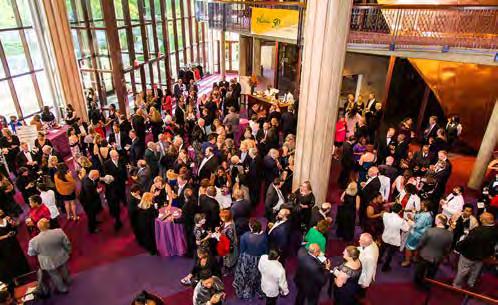
“[The coaches] have really tried to create an environment where students can talk about issues that have a profound effect on them,” says Lowry.
Ganesan used his program oral interpretation event to speak on how British colonialism in India has had an impact on the Hindu faith by promoting homophobia, transphobia, sexism, and colorism.
The team is coached by Lowry and Tyler Watkins, the assis tant director of forensics, with the help of graduate students Brenna Fuhr and Peter Figueroa and alumni Kate Polit, BS Public Administration ’12, MA Communication ’14, and Lucas Muratore, BA Film and Video Studies ’18.
“Every single person on this team has an incredible story, message, and personality behind them. I always feel like I’m winning when I’m with them,” says Mercer. “Getting second place overall for the first time in more than 10 years just vali dated that experience for us.”
—Madison Rudolf, BA ’22
PHOTO BY MELISA PASERO PHOTOGRAPHY
@MASON 6 | 50TH.GMU.EDU
2022 Celebration of Distinction Honors Alumni Leaders

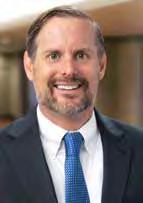
For more than 30 years, the George Mason University Alumni Association has honored outstanding alumni, faculty members, and students at their annual Celebration of Distinction. The 2022 awardees include a diverse group of Patriots who exemplify service to others.

David J. Freedman, BA Philosophy ’98, is the Alumnus of the Year. He is a partner with the Pennsylvania law firm Barley Snyder LLP, where his practice focuses on employ ment litigation and higher education and immigration law. Freedman has received numerous accolades, espe cially for his extensive pro bono practice. Last year, the Central Penn Business Journal recognized Freedman as one of the 30 most influential legal professionals in central Pennsylvania and also awarded him the Legal Excellence Award for pro bono service.
Victoria N. Salmon, DA Education (Community College) ’97, received the Alumni Service Award. She is associate dean emerita for graduate studies in Mason’s College of Visual and Performing Arts. In 2007, Salmon established the CVPA Office of Graduate Studies, which added seven new graduate degrees in the college in seven years. When she retired in 2014, CVPA established the Victoria N. Salmon Outstanding Graduate Student Award in her honor. Salmon continues to serve as chair of the Arts at Mason Board and as an adjunct faculty member.
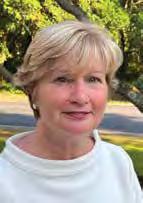
Raquel Gonzalez, BA Integrative Studies ’07, MS Conflict Analysis and Resolution ’12, received the Graduate of the Last Decade (G.O.L.D.) Award. A first-generation college graduate and public servant dedicated to uplifting mar ginalized communities, they spent four years in New York state government leading operations, policy, and diversity
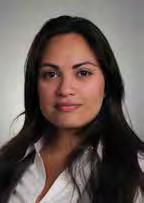
and inclusion initiatives. They were named a 40 Under 40 Rising Latino Star by the Hispanic Coalition of New York in 2018. Previously, Gonzalez was a presidential appointee in four federal agencies and at the White House during the Obama administration.

Wendi Manuel-Scott is the Faculty Member of the Year. She is a professor of integrative studies and history and an affiliate faculty member in women and gender stud ies, African and African American studies, and the Carter School’s John Mitchell Jr. Program for History, Justice, and Race. Manuel-Scott was integral to the Enslaved Children of George Mason project, which led to the creation of the Enslaved People of George Mason Memorial on Wilkins Plaza. She is the co-chair of President Gregory Washing ton’s Anti-Racism and Inclusive Excellence Task Force. Dominique Dowling, BA Integrative Studies ’22, is the Senior of the Year. She is currently pursuing a master’s in early childhood education for diverse learners. Dowling has served in several leadership roles on and off campus, including as president and vice president of the Mason chapter of the NAACP and a student representative on university committees, including the Community Policy Council and the Anti-Racism and Inclusive Excellence Task Force. She was also the secretary of Educators Rising Collegiate and a committee lead for the Virginia State Con ference Youth and College Division of the NAACP. Dowling was one of 25 students selected to be part of the 2021 Vir ginia Governor’s Fellows Program and worked for Virginia Secretary of Education Atif Qarni, MA History ’09.
—Corey Jenkins Schaut, MPA ’07
David J. FreedmanVictoria N. SalmonRaquel Gonzalez
Dominique Dowling
Wendi Manuel-Scott
PHOTOS PROVIDED
To see the full list of honorees, including the 14 distinguished alumni chapter recipients, go to bit.ly/22GMUCoD.
@MASON Summer/Fall 2022 MASON SPIRIT | 7
PHOTO BY SHELBY
Adams and Shehu Honored with SCHEV Outstanding Faculty Awards
George Mason University’s Amarda Shehu and Leah Adams, MA Psychology ’10, PhD ’14, were among the 12 educators from around the state who were formally rec ognized by the State Council of Higher Education for Virginia (SCHEV) with 2022 Outstanding Faculty Awards.

Shehu, a professor in the Department of Computer Science within the College of Engineering and Computing and the new associate vice president of research for the Institute for Digital Innovation, and Adams, a Mason alum and assistant professor in the Department of Psychology and Women and Gender Studies Program, were among the recipients chosen for their superior accomplishments in teaching, research, and public service.
Shehu received the Outstanding Faculty Award. Adams received the Rising Star Award reserved for faculty with two to six complete years of full-time experience.
Adams and Shehu became Mason’s 24th and 25th overall selections since the inception of the Outstanding Faculty Awards in 1987. Also among the Outstanding Faculty Award winners was Mason alum Kwabena Konadu, BS Electrical Engineering ’00, MS Telecommunications ’02, a professor of computer science at Northern Virginia Community College’s (NOVA) Woodbridge Campus and the college-wide head of the cybersecurity program (see story on page 47).
Adams and Shehu both recently sat down to talk about the honor.
What does this recognition by SCHEV mean to you, and what does it mean for your work?
Shehu: I’ve always been driven by putting people first and helping my students in any way, whether it was by leading them or cheering them along. I’ve always been a champion of my students. So this is what the award means to me— recognition of the responsibility we have, the privilege that we have, to turn stories of difficulty and hardship into stories of persistence and success. Our students are getting a great life lesson that will serve them even after they leave the university.
Adams: For me, winning this award feels a little like a fullcircle moment because, when I was a fourth grader moving to Virginia, I knew immediately the impact that my teachers were having [on me]. To be able to now be in a place where I’m being recognized for the impact I’m trying to have on students just feels really amazing.
Tell me a little bit about your research and why it is significant.
Shehu: I’m a computer scientist, but in my training, I was exposed to interdisciplinary research, and have really kept that focus. I am a firm believer that real-world problems are the ones that give us the most challenging questions [and] also inspire us and motivate us to design new computational methodologies, new algorithms. I’ve always looked to make an impact beyond computer science, to improve health and other aspects of the human condition.
Adams: My research sits at the intersection of a lot of dif ferent areas. I’m a clinical psychologist by training, but I’ve always brought in ideas and concepts that expand beyond psychology. So my work [is] trying to understand how people can improve the quality of their lives—mostly folks who are dealing with chronic illnesses or who are at risk for illness or living with acquired disability. How can we maximize quality of life, maximize creating a life that is valuable and meaning ful to them? One of the two places where my work can be helpful is in that real-world applied aspect.
—John Hollis
BURGESS
Amarda Shehu and Leah Adams
@MASON 8 | 50TH.GMU.EDU
Mason Biotech Start-Up Virongy Expands in Northern Virginia
After making striking advancements in HIV and COVID-19 research, Virongy, a biotechnology company in Prince William County, Virginia, has set its sights on tackling even more viruses.
“Our goal is to create advanced diagnostics so that doc tors can promptly prescribe treatments to patients,” says Brian Hetrick, PhD Biosciences ’21, chief scientific officer of Virongy.
George Mason University researcher Yuntao Wu founded Virongy in 2013 after he licensed an HIV drug-screening technology developed in his Mason lab. From there, he set up his new company at the Prince Wil liam County Science Accelerator, a life sciences start-up incubation facility.
Recognizing the technology’s tremendous potential, angel investors and venture capitalists sought out Virongy for investment. The company also has been the recipi ent of multiple grants, including a Prince William County Department of Economic Development’s IGNITE program grant and a Small Business Innovation Research grant through the National Institutes of Health. With the compa ny’s rapid growth, Wu knew Virongy needed more space.
The opening of the Northern Virginia Bioscience Center brought Wu his answer and allowed Virongy to move into a 1,600-square-foot lab. Both Wu and Hetrick are excited about the opportunities that come with the expansion.
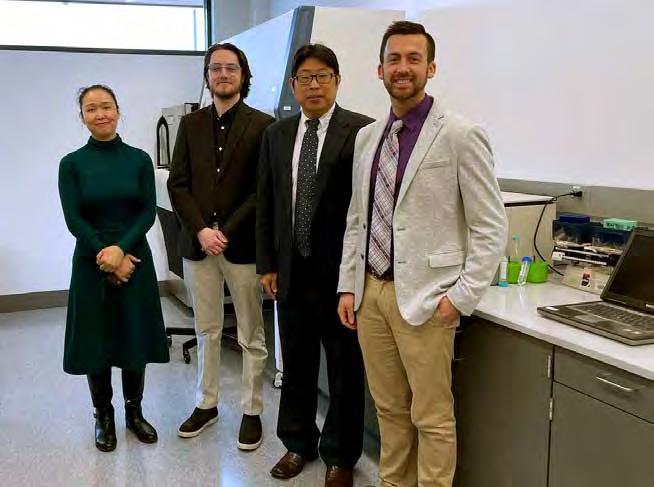
“Not only can we bolster our research capabilities, but we also aim to be a supplier of new jobs in the area,” says Hetrick.
Virongy is one of the life sciences companies that are part of the Northern Virginia BioHub, which was recently established through Virginia Bio-Connect and funded by a $3.2 million GO Virginia matching grant. Susan Baker, managing director of GO Virginia’s Region 7, sees the grant as money well invested.
“Projects like these are extremely important for eco nomic growth and talent development of high-wage jobs in our region,” says Baker.
While the move has kept them busy, Virongy has no plans to slow down. One of its next steps includes obtain ing Good Manufacturing Practices (GMP) certification in order to open a GMP lab. The certification ensures that all products produced in the lab are safe and effective and will expedite the FDA approval process for any products the company intends to bring to market. Virongy anticipates having GMP certification within the next several months.
“We constantly strive to bring forward innovative solu tions that break past limitations of existing technologies,” says Wu. “If there is a faster way to tackle some of global health’s most pressing challenges, we will do it.”
—Katie Maney
From left, Virongy staff members include senior product technician
Dongyang Yu, business and marketing associate Bruce Franz, founder Yuntao Wu, and chief scientific officer Brian Hetrick.
ILLUSTRATION BY GETTY IMAGES PHOTO BY AMY ADAMS/INSTITUTE OF BIOHEALTH INNOVATION
@MASON Summer/Fall 2022 MASON SPIRIT | 9
Headed to College, Thanks to EIP
Nora Kurtishi, a Manassas Park High School graduate headed to George Mason University in the fall, credits Mason’s Early Identification Program (EIP) for her success in high school. Kurtishi, who plans to study biology, has been named a University Scholar and received a College of Science Promise Scholarship.
“The program was really grounding to me since I was meet ing like-minded students on a regular basis,” says Kurtishi, who will be part of Mason’s Honors College. “They, along with the EIP mentors, helped me not lose sight of my goal of college.”
Kurtishi, who spoke at this year’s EIP graduation ceremony, is one of 112 graduating seniors from high schools across Northern Virginia who participated in EIP. Ninety-five of those graduates have been accepted to a college, of which 42 have decided to attend Mason.

For more than 30 years, EIP has helped first-generation college-bound students achieve academic success by providing access to educational resources, mentoring, and programming for students from seven local public school systems, including Fairfax County, Manassas City, Prince William County, Arlington County, and Alexandria City. Mason students, many of whom are first-generation college students themselves, help with mentoring.
Khaseem F. Davis, EIP director, says this group of graduating seniors is special because of their awareness of social issues and determination to do something to change the world.
“Collectively, they’ve witnessed a great deal of social strug gle,” Davis says. “They are more self-aware and socially aware
than a lot of the students I’ve witnessed graduate from EIP. Many of them want to pursue careers that will allow them to make societal change. I see many of them doing great things in the years to come.”
Donovan Cloud, who graduated from Unity Reed High School, says EIP allowed him to gain confidence in himself. Cloud has more recently developed an interest in graphic design.
“EIP helped me blossom,” says Cloud, who will be a member of Mason’s Honors College and is exploring what major to select. “I was more insecure about myself, but EIP lifted that off of me.”
Monica Amaya, another Manassas Park High School grad uate, plans on studying information systems and operations management as a University Scholar. Amaya says that EIP mentors were inspirational.
“The mentors supported us with any questions we had about academics and colleges,” Amaya says. “They also got us emotionally. They weren’t just random people, but actual students at Mason who had gone through what we went through to get there.”
Amaya, who works part time in a restaurant to help her family financially, says she’s looking forward to meeting new people in college and continuing her goal of finding a fulfill ing career.
“It still hasn’t hit me that I’ve graduated,” Amaya says.
—Anna Stolley Persky
2022 EIP grads Donovan Cloud, Anni Bennet, Sara Berhe-Abraha, and Nora Kurtishi
Learn more about EIP on page 24
PHOTO BY
SIERRA
GUARD @MASON 10 | 50TH.GMU.EDU
New Deans Join Mason
This summer, George Mason University welcomes three new deans.
Ajay Vinzé, professor and former dean of the Trulaske College of Busi ness at the University of Missouri, has been named the next dean of Mason’s School of Business. He assumed his role on July 1, 2022.
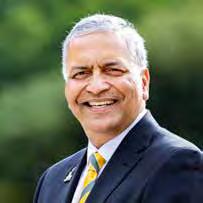
As dean, Vinzé helped secure more than $30 million in philanthropic funding for the Trulaske College of Business, which enrolls more than 4,200 undergraduate students and 379 graduate students. Under his leadership, the college entered the virtual learning space, began offering microcredentials and certificates, and increased student experiential learn ing opportunities.
Vinzé completed his doctoral degree at the University of Arizona after receiving a master’s degree from the University of Connecticut and a bachelor’s degree from the Univer sity of Delhi.
Ingrid Guerra-López has been named the next dean of Mason’s College of Education and Human Development. She assumed this role on July 1, 2022.
Guerra-López comes to Mason from Wayne State University, where she served as the interim dean of the Col lege of Education and a professor in the learning design and technology program in the academic division of administrative and organiza tional studies. She also served as the interim dean of the graduate school, special advisor on digital learning strategy and innovation, director of the Institute for Learning and Perfor mance Improvement, and as an aca demic program coordinator.
She earned bachelor’s, master’s, and doctoral degrees from Florida State University. She also completed postgraduate executive education programs at both Harvard University and the Massachusetts Institute of Technology.
Melissa J. Perry has been named the next dean of Mason’s College of Health and Human Services. She joined Mason on August 1, 2022, after completing an assignment in Albania as a fellow in the Fulbright International Education Program for Global Scholars.


Perry comes to Mason from George Washington University where she served as a professor and chair of the department of environmental and occupational health in the Milken School of Public Health since 2011. She previously served as interim associate dean for research at the Milken School and had faculty appointments at the School of Medi cine and Health Sciences.
Perry earned her MHS and ScD degrees from the Johns Hopkins Bloomberg School of Public Health and a BA from the University of Vermont. She is currently working on an MBA at Mason.
Ajay Vinzé
Ingrid Guerra-López
Melissa J. Perry
PHOTO BY RON AIRA
PHOTO BY RON AIRA
PHOTO BY EVAN CANTWELL
@MASON Summer/Fall 2022 MASON SPIRIT | 11
A Trip Down Memory Lane
As a part of the yearlong 50th Anniversary celebration, George Mason University is hosting two exhibits that highlight five decades of life at Mason.
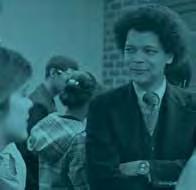
The University Libraries’ Special Collections Research Center (SCRC) is sharing some documents, artifacts, and photography from the archives in its new exhibit We Are Mason: A Student History

Located in the SCRC exhibit space on the second floor of Fenwick Library, this exhibit goes beyond the university’s first 50 years as an independent university to its origins in 1957. It uses images and physical objects to illustrate student life throughout the years, as well as show the development of university traditions, growth of the campus, and milestones in our institution’s history.
As the title suggests, Mason students, as both witnesses to and actors in the university’s history, are the focus of the exhi bition, says university historian and Mason alum Bob Vay, BA History ’92, MA ’99, who curated the exhibition. Vay is quick to point out that it was a team effort.
“My colleagues in SCRC and I conceived the idea for this exhibition last fall. We spent a significant amount of time mulling over different angles and ideas,” says Vay, who began working for University Libraries in 1993. “Our goal with this exhibition was to present more of a grassroots-level interpre tation of our history.”
“While the entire staff of SCRC and our [graduate research assistant] Lillian Poole helped shape and finally put this together, we received a lot of help from other library depart ments, particularly Preservation Services and the Office of the Dean. Other units outside the Libraries, such as Print Services, Creative Services, and University Branding, contributed significantly to the finished product.”
The exhibition features manuscript records, university publications, and photographs from three collections in the SCRC holdings:
The Richard Sparks photograph collection, which features 121 images of George Mason College life taken between 1961 and 1965 by then Mason student Richard Sparks;
The Broadside Photograph Collection, which contains more than 55,000 images captured by Mason students working for the Broadside student newspaper between 1973 and 2001; and
The George Mason University Photograph Collection, which contains more than 120,000 images taken by Mason’s Office of University Relations from the mid-1950s to 2007.
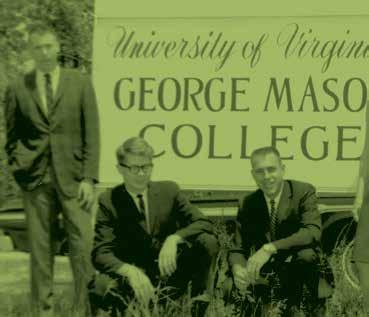
@MASON 12 | 50TH.GMU.EDU
A second exhibit on the lower level of Horizon Hall looks back at Mason in the 1970s, 1980s, and 1990s with photos captured by student photographers working for Broadside
The exhibit, Past, Present, Future: Mason’s Core Remains Constant, is curated by Mason graduate student Melissa Cannarozzi, who is a production coordinator and digital collections manager in Mason’s Office of University Branding. Cannarozzi is working on a master of arts in history with a concentration in applied digital history and designed the installation as part of an internship class.
Divided into six categories—Growth, Diversity, Engage ment, Opportunity, Student Life, and Traditions—the exhibit illustrates student life at Mason then and now.
“I was trying to create something that would appeal to cur rent students,” says Cannarozzi of the exhibit. “I was surprised so many alumni showed up at the opening and actually knew people in the photos. I’m glad people are able to con nect with the exhibit.”
Both exhibits run through December 2022.
OPPORTUNITIES TO REMINISCE
Special Collections Research Center
In addition to the exhibit, SCRC has been posting historic images and stories on social media. Follow them at @gmuscrc
@gmuscrc
@gmuspecialcollections
Retro Mason
Using photographs from the SCRC collections and other stories, Retro Mason highlights a photo and story each week from Mason’s past, featuring moments such as Mason economist James Buchanan winning the Nobel Prize in 1986 and a 2010 dodgeball game that earned Mason a Guinness World Record. bit.ly/retromason
Broadside Photo Collection
This collection contains more than 55,000 images captured by Mason students working for the Broadside student newspaper between 1973 and 2001. bit.ly/BroadsideGMU
Read the Broadside
Some digitized issues of the Broadside and the Gunston Ledger, Broadside’s predecessor, are available online. ahistoryofmason.gmu.edu
Yearbooks
Browse more than 50 years of Mason yearbooks, including the Advocate and GMView. bit.ly/GMUyearbooks

For more historical stories and information about the yearlong celebration, visit 50th.gmu.edu.

—Colleen Kearney Rich, MFA ’95
MORE
@MASON Summer/Fall 2022 MASON SPIRIT | 13
Documenting Black Life at Mason
As part of an effort to research and record local history, George Mason University graduate and undergraduate students, along with faculty, have begun documenting the lives of Black students who attended Mason and lived in the Black communities that once existed in Fairfax County.

In fall 2021, the Black Lives Next Door website went live with initial research exploring the early years of George Mason College and its transition to a university in 1972. The project, conducted under the auspices of the Center for Mason Legacies, is an ongoing interdisciplinary collaborative effort to highlight voices that history has suppressed.
“This project reflects what we believe: the importance of researching and understanding the past, the importance of showing just how messy history is,” says Mason history librar ian George Oberle III, BA History ’96, MA ’98, PhD ’16, direc tor of the Center for Mason Legacies. “What we’ve learned is that Mason, while one of the most diverse destinations of higher learning in the U.S., has a haunting past.”
Benedict Carton, associate professor in the College of Humanities and Social Sciences; LaNitra M. Berger, associate director of the African and African American Studies Program and senior director of fellowships in the Office of Undergrad uate Education; and Oberle are the founders and primary supervisors of the Black Lives Next Door Project.
The website has a section titled Black Student Biographies, which includes individual stories of Black students in the early days of Mason and the struggles they faced. One biog raphy describes Irma R. Willson’s battle in the 1960s, first for enrollment in the college and then to change the campus environment. Other sections delve into such topics as racial ridicule at Mason and School Street, a Black community that once existed near the Fairfax Campus.
“I hope that the legacy of this project is that we recognize what happened in our history and highlight problems from Mason’s past and the community’s past that maybe people don’t want to recognize but should for the sake of recogniz ing and honoring the erased Black history of Fairfax,” says government and international politics major Veronica Mata, who participated in the research.
The project was inspired by a New York Times opinion piece “Black Lives Next Door” by legal scholar Richard Rothstein, who called for more studies of “comprehensive racial ineq uity” at the local level, says Berger.
“Now that Mason is turning 50, it’s a good opportunity to look backwards like this and embrace the past, both the good and the bad, as part of the discussion of what Mason will be like going forward,” says Berger.
—Anna Stolley Persky
Action to End Segregation in Suburbs A photo from the project shows ACCESS marchers moving from Alexandria to Arlington on a three-day, 14-mile march for Northern Virginia Open Housing in 1966. PHOTO PROVIDED BY BLACK LIVES NEXT DOOR @MASON 14 | 50TH.GMU.EDU
MEET THE MASON NATION
When Alissa Karton began working at Mason in 1996, the university looked like a very different place, with fewer residence halls, fewer students, and a reputa tion for being a commuter school. In her various roles with University Life, Karton has had an insider’s view to seeing Mason transform into what she calls “a university that is basically as big as a small town.”
How the University Got a Life—University Life, That Is: When Karton started working at Mason, her unit was known as Student Services, a name that changed to University Life under the helm of former Mason president Alan Merten. That name shift heralded more changes in response to evolving student needs and demographics.
“[It] really set a new wave of opportunities for student services staff to work directly with faculty on building con nections inside and outside of the classroom,” Karton says. Now, University Life has grown to encompass a whole cohort of organizations and programs, all with the goal of supporting Mason students’ success.
What Makes a Mason Student: Over the past 26 years, Karton has encountered thousands of students in hun dreds of different types of interactions, from her work with

student organizations and University Life events, to her roles as a mentor and instructor of UNIV 100. “One thing that defines our students is there is no one commonal ity,” she says. “Our students are resilient and kind to one another. Most are very determined to make the most of their Mason experience and to succeed to make their fam ilies and themselves proud.”
Many Hats, One Favorite: From being an organizer for fundraisers like the Diversity Scholarship Golf Classic, or former student events like First Fridays or Summer Socials, to teaching and mentoring, Karton has worn many hats during her Mason career, describing herself as a “utility player, fulfilling roles and taking on projects that sup port the division and the university.” But when asked to pick a favorite, Karton doesn’t hesitate: “Anything I was involved in that brought members of the Mason commu nity together with folks that they wouldn’t normally be interacting with on a daily basis at work or in study is my favorite thing.”
—Priyanka Champaneri, BA ’05, MFA ’10
ALISSA KARTON
Job: Assistant to the Vice President and Director of Special Projects, University Life
PHOTO BY EVAN CANTWELL
@MASON Summer/Fall 2022 MASON SPIRIT | 15
Pomp and Circumstance
On May 20, George Mason University graduated more than 10,000 degree and certificate earners in its 2022 Spring Commencement Ceremony at EagleBank Arena on the Fairfax Campus.
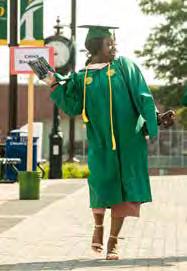
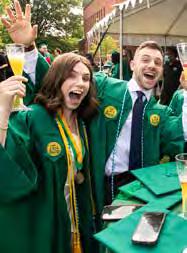
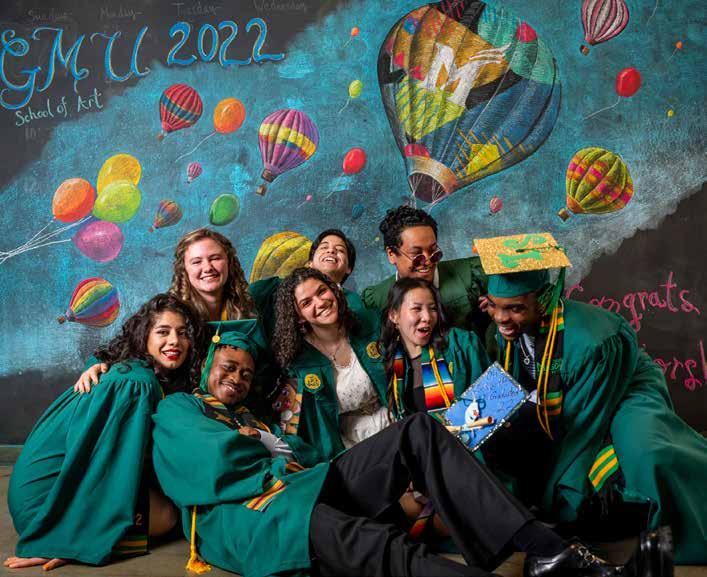
The 10,512 individuals who earned degrees and certificates are from 89 countries, 47 states, Washington, D.C., Puerto Rico, the U.S. Virgin Islands, and foreign military installations.
Of the 6,392 individuals who earned bachelor’s degrees, 27 percent report they are first-generation college graduates.
Mason produces a significant number of graduates in science, technology, engineering, and math (STEM) fields—38 percent of those who earned bachelor’s degrees, and 24 percent of the 3,199 individuals who earned graduate degrees.
The top five undergraduate majors were information tech nology; psychology; information systems and operations management; computer science; and criminology, law and society.
For the 2,905 individuals who earned master’s degrees, the top five majors are curriculum and instruction, special educa tion, data analytics engineering, business administration, and education leadership.
The top majors for the 294 doctoral candidates who received their degrees are education, economics, earth sys tems and geoinformation sciences, electrical and computer engineering, and psychology.
There were also 132 law school graduates.
This was the first in-person spring graduation ceremony since 2019.
—Preston Williams
PHOTO BY ELIZABETH KARTCHNER
@MASON 16 | 50TH.GMU.EDU



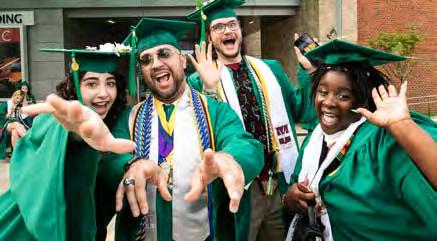



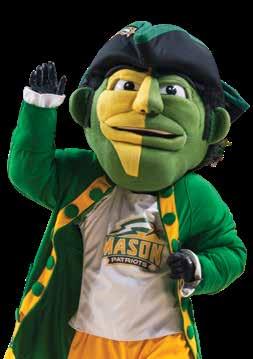
Class of 2022
PHOTO BY RON AIRA
PHOTO BY RON AIRA
PHOTO BY RON AIRA
PHOTO BY RON AIRA
PHOTO BY EVAN CANTWELL
PHOTO BY EVAN CANTWELL
PHOTO BY RON AIRA
@MASON Summer/Fall 2022 MASON SPIRIT | 17
BLAZING
TRAIL
Mason’s
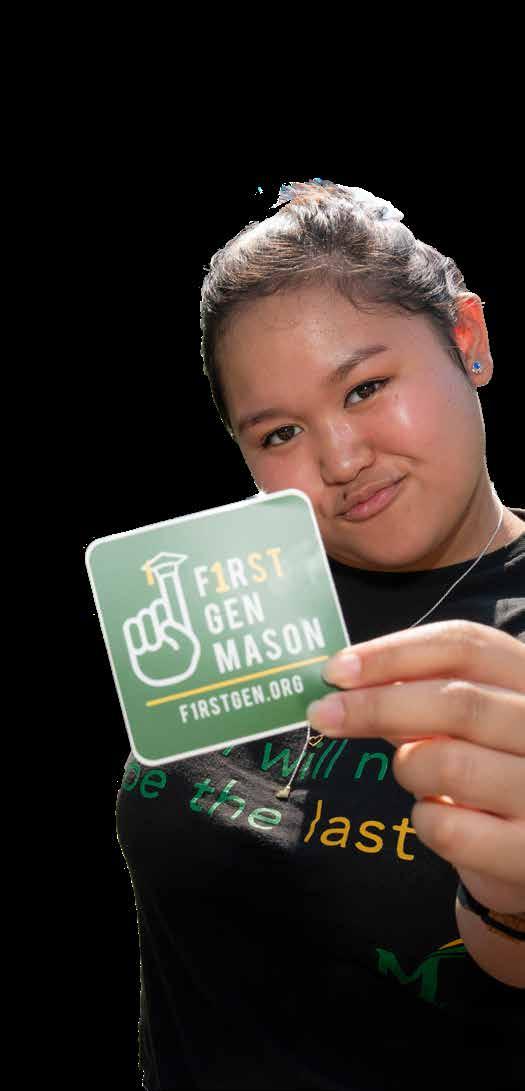 BY COLLEEN KEARNEY RICH, MFA '95
BY
BY COLLEEN KEARNEY RICH, MFA '95
BY
first-generation students are no strangers to overcoming bias or barriers to attend college. Their remarkable tenacity keeps them striving for more.
A
PHOTO
EVAN CANTWELL 18 | 50TH.GMU.EDU
They have a vision for a better life for themselves
Mason Nation would not be what it is with out our first-generation students. Nearly 40 percent of George Mason University students identify as being the first in their families to attain a college degree. Of those, 33 percent are eligible for need-based Pell Grants, which is greater than Virginia’s average.
In Mason’s Class of 2022, 27 percent of the grad uates identified as first generation.
President Gregory Washington, himself a first-generation college graduate, talked about first-gen students during his Investiture address in October 2021.
“We’ve always prided ourselves on putting stu dents first, and they have truly shown us what they are made of,” Washington told the audience in EagleBank Arena. “Most of our students hail from historically disenfranchised communities—three out of 10 are first generation. They have a vision for a better life for themselves, their families, and their communities, and they are not strangers to adversity, occasional rejection, and hard work.”
Mason’s definition of a first-generation college student includes someone whose parent or legal guardian(s) did not receive or complete post-secondary education, or who received a two-year degree, or earned any level of postsecondary education outside the United States.

“Sometimes we have Mason students come up to us who real ize that they are also first-generation college students because of how we define it,” says Amber Holton-Thomas, director of the First-Gen+ Center. “Just because, for example, someone’s parents got an advanced degree outside the [United States] doesn’t mean they understand or have experience with navi gating the U.S. college system, so we are here to help.”
In 2021, the national Center for First-Generation Student Success, an initiative of the National Association of Student Personnel Administrators (NASPA) and the Suder Foundation, named Mason to its 2021–22 First-Gen Forward cohort. The designation recognizes institutions of higher education who have demonstrated a commitment to improving experiences and advancing outcomes for first-generation college students. Selected institutions receive professional development, com munity-building experiences, and a first look at the center’s research and resources.
Summer/Fall 2022 MASON SPIRIT | 19
Navigating the University Experience
To help first-generation college students navigate a large university, Mason’s University Life created the First-Gen+ Center in 2021 to provide resources, mentoring, and programming.
The First-Gen+ Center’s mission is to support students who are histori cally underrepresented in higher education and their allies, while specif ically focusing on students who identify as first-generation, who identify as undocumented, have refugee status, or belong to families with lim ited income. In 2020, about 26 percent of Mason students described themselves as first-generation college students. About 7,500 currently enrolled Mason students are connected to the First-Gen+ Center.
“We take seriously our role in helping students who might not otherwise have the chance [to] pursue their higher education with success,” says Amber Holton-Thomas, director of the First-Gen+ Center. “The University Life vision is that ‘every student succeeds,’ and one big way our depart ment helps is by demystifying the university process.”
The First-Gen+ Center can trace its roots to the Student Transition Empowerment Program (STEP), which began in 1990 as the Summer Transition Program. STEP, which still exists, was Mason’s first effort to help first-generation college students get acclimated to the college experi ence. STEP joined University Life in 2005.
In addition to organizing STEP, the First-Gen+ Center facilitates schol arships, offers one-on-one discussion sessions, oversees a mentoring program, creates programming for First-Gen Week, coordinates training related to undocumented students, hosts community-building events, and sends out a weekly newsletter.
The center has both professional and student staff who are first-gen eration college students themselves, intent on giving back, says Holton-Thomas.
Computational and data sciences major Oliver Yu, who worked for the center as a research assistant, agrees: “The students that work within the First-Gen+ Center are passionate in their roles and look for ways to best utilize them to help others.”
—Anna Stolley Persky
PUTTING RESOURCES IN PLACE
First-generation college students face various barriers when trying to excel both academically and socially. Mason works to eliminate these additional barriers and foster first-generation student success through intentional programming and catered support. This support includes:
• Early Identification Program: Mason’s college preparatory program collaborates with local public school systems to provide access to educational resources for middle and high school students who will be the first in their families to attend a college or university. The program boasts more than 1,600 graduates and has 600 students currently enrolled at Mason (see story on page 24).
• Student Transition Empowerment Program (STEP): This Center for Culture, Equity, and Empowerment (CCEE) initiative was created in 1990 to enhance the recruitment, engagement, and retention of first-generation college students accepted to Mason.
• First-Gen+ Center: This year-old center in Mason’s University Life division provides resources, mentoring, and programming for first-generation students.
• First-Generation Peer Mentoring Program: CCEE’s mentoring program supports first-genera tion student success.
• First-Generation Student Task Force: This task force is led by Mason faculty and staff who were first-generation students themselves.
Additionally, the student organization F1rst Gen @ Mason boasts more than 200 members and aims to provide opportunities for first-gen stu dents to make connections with others to help them overcome the obstacles they face and make the most of their college experiences. In the spring semester, this group hosted its sev enth I Am First Stories night, an event where first-gen students, alumni, and faculty and staff share their success stories.
20 | 50TH.GMU.EDU
PHOTO BY RON AIRA
SHARING THEIR STORIES
Arturo Barrera, BA Conflict Analysis and Resolution ’21, was among those sharing their stories at the I Am First event. Barrera is the first in his family to attend college in the United States, but he acknowledges that he didn’t get there alone. He credits his parents for their perseverance in a new country after emigrating from Bolivia. He also says Mason began supporting him long before he was a freshman.
“The Early Identification Program gave me resources and a different way of seeing the idea of college,” says Barrera, who joined the preparatory program in seventh grade. “I wanted to give back what they gave to me.”
Since coming to Mason, Barrera says he is most proud of helping first-generation students attend college and achieve their dreams. He has served as a college readi ness instructor and academic success coach for EIP. “It was a little intimidating [mentoring high schoolers], but it developed me as a leader in that I gained a lot of confi dence,” says Barrera, who is currently working on an accel erated master of public administration degree. “I also was a peer advisor for a University 101 class—if it wasn’t for EIP, I would’ve never considered that.”
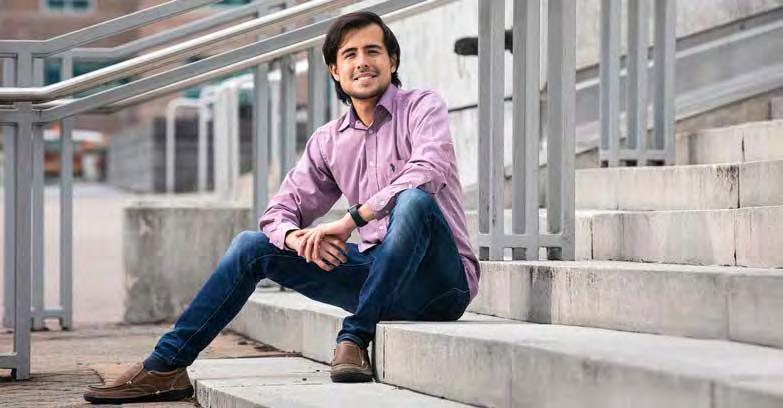
Sophomore Hazel Cartagena also used EIP’s resources. After coming to the United States from El Salvador to join her mother late in 2010, Cartagena enrolled in EIP. She was an academic star at Freedom High School in Woodbridge, Virginia, and earned a spot in Mason’s University Scholars Program, which offers academically outstanding incoming freshmen a four-year, full-tuition scholarship.
A member of Mason’s Honors College, Cartagena says she has a good start thanks to EIP, which introduced her to mentors and faculty members she believes will be part of her network even after she graduates.
Just as important, though, were introductions to other first-generation students and students of different back grounds who would join her at what is already the most diverse public research university in Virginia. She calls it a “built-in community.”
“I remember seeing a lot of people from different places, different countries, and, at least for me, that helps,” says Cartagena, who is majoring in accounting. “It encourages me. All these people from all these places are trying to do their best and put in that effort to have something better for themselves. For me, it is really inspiring.”
All these people from all these places are trying to do their best and put in that effort to have something better for themselves.
Arturo Barrera Summer/Fall 2022 MASON SPIRIT | 21
In fall 2021, to commemorate the National FirstGeneration College Celebration, the university put out a call on social media for the Mason Nation to share their first-generation stories. Many students talked about the importance of the Mason centers and resources in help ing them feel like part of the community.
Mason alum Kareema Smith, BA Psychology ’15, MS Educational Psychology ’16, credits the Student Transition Empowerment Program (STEP) for having a huge impact on her academic life. She says she heard about the program at an admitted-student event before she started at Mason. “Thanks to STEP I was able to enter college with other first-generation stu dents the summer before our first year began, where we learned so much and established true community,” says Smith. “At 18 years old, that program gave me the tools and confidence to become a leader on campus, to truly care more about the humanity of others, and to think critically while challenging myself and my ideals.”
And Smith continues to pay it forward. From 2016 to 2019, Smith was the director of student success at Mason’s Honors College. She is now a career counselor at Auburn University, where she is pursuing a PhD in counseling psychology.
For alum Bianca Alba, BS Community Health ’11, MPH ’15, EIP was a portal of opportunity.

“Also, getting involved with my Latina sorority, Chi Upsilon Sigma, opened up network opportunities and provided me with women role models who had their life and careers set,” says Alba, who now works as a public health analyst.
Graduate student Isidore Nsengiyumva, who is attending Mason online from Kenya, says the National First-Generation College Celebration serves as a great personal reminder of everyone who has supported and sacrificed for him to get where he is today.
Nsengiyumva spent part of his childhood living in refugee camps after fleeing his native Burundi during the civil war there. He is now a Charles E. Scheidt Fellow at Mason’s Carter School for Peace and Conflict Resolution.
“It is also a good time for reflection on how far I have come and what it took for me to get here,” Nsengiyumva says.
Mariam Aburdeineh, BA ‘13, Damian Cristodero, and Anna Stolley Persky contributed to this feature.
PHOTO BY EVAN CANTWELL
[STEP] gave me the tools and confidence to become a leader on campus, to truly care more about the humanity of others, and to think critically while challenging myself and my ideals.
Hazel Cartagena
22 | 50TH.GMU.EDU
WORDS OF ADVICE
Don’t be so hard on yourself! It is okay to fail, but just because you fail a class doesn’t make you a failure. I had to learn the hard way. Surround yourself with like-minded people, and remember self-care is also important.
BIANCA ALBA , BS COMMUNITY HEALTH ’11, MPH ’15
Some of our professors were first-generation students themselves and understand what we’re going through. Support your fellow students, and they will support you back in their own ways. This support that you receive from others will give you a strong sense of motivation and inspiration to work hard academically and professionally.
Don’t forget where you come from, be humble, and don’t forget to thank those who helped you attend college. You can thank them by making sure you graduate and being the positive change that we need in our society. Lastly, don’t forget to make lifelong friends. Together, we can make our network stronger.
Don’t ever ignore your mistakes; learn from them. We know what it’s like to feel scared and overwhelmed because we’re first-gen, we’re all in this together.
ELECTRICAL ENGINEERING MAJOR JOHN SEJAS-CORDOVA, CLASS OF 2024
Be awesome, follow your dreams, and don’t feel the pres sure of overachieving. The mere fact that you’re enrolled in a university working toward a better future is more than enough. Be proud, work hard, and be thankful for everything, and don’t waste the opportunity to prepare for a better future.
Never be afraid to ask for help! There are so many resources on campus and beyond to help you succeed during this time. There will definitely be some things about college that you won’t know about that others will—this isn’t something to be ashamed of. It is an opportunity to learn.
PHYSICS PHD STUDENT PHOEBE MCCLINCY
We asked our first-gen students and alumni to share advice they could pass on to other first-gens.
KENNY RAKWONG , BS INFORMATION SYSTEMS AND OPERATIONS MANAGEMENT ’22
LISA CASTRO , BS MANAGEMENT ‘09, MA INTERNATIONAL COMMERCE AND POLICY ’17
THOMAS OH , BS CRIMINOLOGY, LAW AND SOCIETY ’13, MBA ’19
Summer/Fall 2022 MASON SPIRIT | 23
When Hortensia Cadenas directed EIP from 1989 to 2010, her office was filled with photos of EIP graduates. She is pictured here in 2007 when the program was celebrating its 20th anniversary.
 PHOTO BY EVAN CANTWELL
PHOTO BY EVAN CANTWELL
24 | 50TH.GMU.EDU
OPENING DOORS
BY ANNA STOLLEY PERSKY
Monica Amaya, a senior at Manassas Park High School in Virginia, balances studies and a job at a restaurant. She gives part of her paycheck to her father so they can pay their bills. In the fall, Amaya will be attending George Mason University and has been accepted into the Honors College. She credits Mason’s Early Identification Program (EIP) with getting her ready for college.

“The program pushed me, motivated me, throughout high school so I could set an example for my younger siblings and show that it is possible for us to achieve our dreams,”
says Amaya, who will be the first in her family to go to college. “We can do anything if we work hard.”
There are thousands of Northern Virginia students like Amaya who can credit Mason’s EIP mentors and administrators for helping focus, encourage, and guide them through the rigors of high school academics and the maze of the college application process. The program specifically centers on lifting up students from traditionally marginalized communities and students who will be the first in their families to attend college, also known as first-generation students.
PHOTO BY SIERRA GUARD
Monica Amaya
For 35 years, Mason’s Early Identification Program has been helping Northern Virginia middle and high school students prepare for college careers.
Summer/Fall 2022 MASON SPIRIT | 25
PHOTO BY EVAN CANTWELL
The program was established in 1987 as the brainchild of then Fairfax County Public Schools superintendent E. Wayne Harris and then Mason president George Johnson. After more than 30 years, EIP has grown into an innovative, multi-year college preparatory program for middle and high school students that is unique in the country not just for its breadth and reach, but also for the way it cel ebrates and embraces its students, according to EIP graduates, employees, and former direc tor Lewis E. Forrest II, BA English ’96, MEd Counseling and Development ’05.
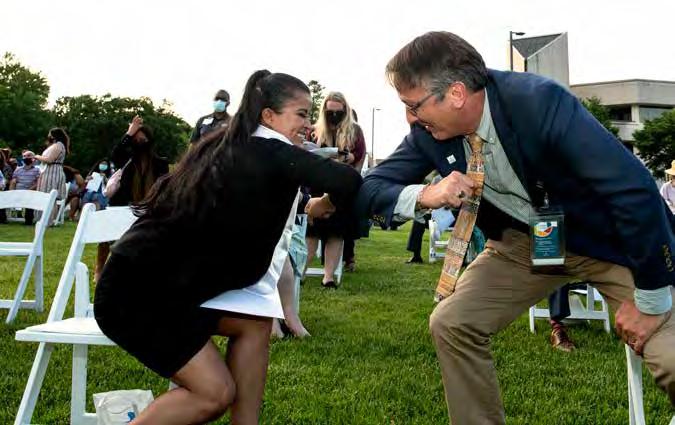
“There are other precollege programs and success programs out there,” says Forrest, now an associate dean in the Office of University Life at Mason. “But what makes EIP special is the level of care and commitment to these students. When they go through the program, students feel like they have a family at EIP, a family that cares deeply about how they are doing and seeing them succeed.”
At the time of EIP’s birth, there was a growing body of data showing that student enrollment from marginalized communities was low in part
because students were not getting the prepara tion they needed to attend college. Harris and Johnson determined that there had to be a way to help these students develop the skills they needed to attend and succeed at college. Harris and Johnson partnered on an idea that initially centered on a summer academy to give stu dents a chance to strengthen their academics in an encouraging environment.
“From the start, Mason has believed in the pro gram and cared about the community around them and finding ways to help,” says EIP’s first director Hortensia Cadenas, BA Spanish ’80, MA Foreign Languages ’93. “They saw a need in the community, and they did something about it.”
Funded by the State Council of Higher Edu cation for Virginia, the pilot program reached 48 Fairfax County Public Schools students.
“Word spread quickly,” says Cadenas, who was hired in 1989 and ran the program until her retirement in 2010. “Other school systems started signing on. Arlington came next, then Prince William County.”
PHOTO BY EVAN CANTWELL
Seeing the program’s impact on students is Khaseem Davis’s favorite part of his job. “We are able to change the life circumstances of these young men and women because of Mason,” he says.
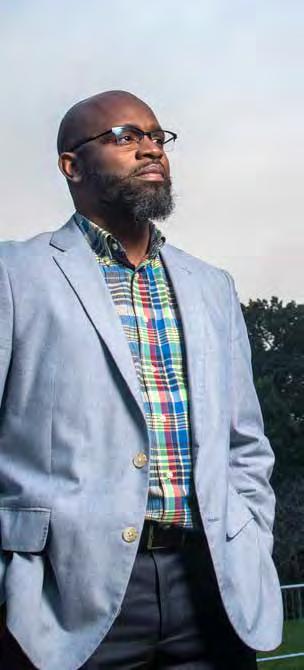
26 | 50TH.GMU.EDU
Former Fairfax County Schools superintendent Scott Brabrand congratulates Early Identification Program senior graduates at the 2021 EIP recognition ceremony on the Mason’s Fairfax Campus.
In the summer academies, EIP students are exposed to the STEM fields, including robotics and laboratory sciences.
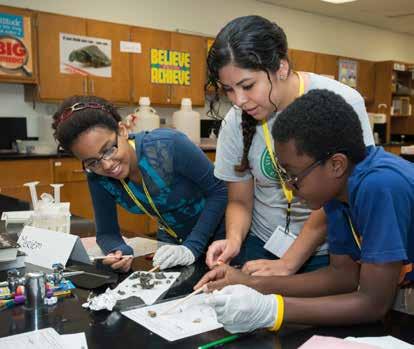

EIP now serves more than 700 students annually. The program provides access to educational resources for students from seven local public school systems, helping them acquire the skills they need to become lifelong learners, leaders, and responsible global citizens.
Students who are interested in the program apply during their seventh-grade year.
If selected, they then spend the next five years in mentoring sessions, tutoring, a mandatory three-week summer academy, and additional programming intended to boost their academics, with a specific focus on science, technology, engineering, and mathe matics (STEM).
“Over the past few years, we’ve been fine-tun ing the program, building its infrastructure,

and deepening our engagement with students,” says Khaseem Davis, current EIP director. “It is continuing to grow as we broaden the impact we have on students throughout the region.”
Davis credits Cadenas for growing the pro gram early on. One of the first things Cadenas did as director was to increase opportunities for connections with students’ families.
PHOTO BY EVAN CANTWELL
PHOTO BY ALEXIS GLENN
PHOTO BY RON AIRA
2021 EIP graduation ceremony at Mason Square.
Summer/Fall 2022 MASON SPIRIT | 27
“We added parenting and family classes so that we could establish communication with the parents, and they would [have opportunities to] understand how important college edu cation was for their children’s future,” Cadenas says. “We needed to know that the students had support at home.”
After adding family classes, Cadenas says they began strengthening the academic experi ences, creating new weekend events for math and science review, along with opportunities to explore different careers. They found partner ships with local businesses and created college scholarship opportunities as well as tutoring jobs for EIP graduates attending Mason.
“For many of these students, being part of EIP is life-changing,” says Rhina Alvarado, BA ’07, MEd ’21, EIP’s associate director. “While they were motivated before, they start to see a path for themselves and they have a commu nity that cares whether they get there. They have people who engage holistically in their development into adults.”
As college applications become more onerous, there’s an even heavier focus on the logistics of the admissions process, including helping stu dents and parents understand the implications of a financial aid package.

“The parents of our students may care deeply about their children going to college but often don’t have the experience or understanding of what the application process entails,” says Alvarado. “We can guide our students and their families in every aspect of the process. We put a lot of blood, sweat, and tears into the success of every one of our students.”
One major benefit of participating in the program, alumni say, is establishing close friendships with students similarly motivated to excel.
“If you are a graduate of EIP, you still care deeply about the friendships you made during that time and about the program,” says Alvarado, herself an EIP alum who holds two Mason degrees. “You have a loyalty you never forget.”
THE NUMBERS
Figures from the 2021–22 academic year
28 | 50TH.GMU.EDU BY
Lewis Forrest (center in blue) led EIP from 2010 to 2015.
EIP
PHOTO BY RON AIRA

 Keyri Amaya and Stacy Maravi both graduated from EIP in 2021 and chose Mason.
Keyri Amaya and Stacy Maravi both graduated from EIP in 2021 and chose Mason.
Summer/Fall 2022 MASON SPIRIT | 29 TOTAL PROGRAM ENROLLMENT CLASS OF 2022 176 (8TH GRADERS) + 573 (9-12TH GRADERS) 749 112 96% 89% 42 30 GRADUATES ENROLLED IN COLLEGE GPA OF 3.00 OR HIGHER WILL ATTEND MASON EARNED SCHOLAR SHIPS LATINO/A 412 AFRICAN AMERICAN 198 ASIAN/PACIFIC ISLANDER ........................ 67 MIXED/MULTIRACIAL 26 WHITE 19 MIDDLE EASTERN 18 NOT IDENTIFIED 6 OTHER 3
PHOTO
BY
EVAN CANTWELL
PROMISE THAT’S A
 From left, Mason President Gregory Washington, student Amara Zavala, Germanna President Janet Gullickson, and students Michele Adjei-Fah, Grant Davis, and William McDonnell at Germanna's Fredericksburg campus for the launch of the new Mason Academy.
From left, Mason President Gregory Washington, student Amara Zavala, Germanna President Janet Gullickson, and students Michele Adjei-Fah, Grant Davis, and William McDonnell at Germanna's Fredericksburg campus for the launch of the new Mason Academy.
30 | 50TH.GMU.EDU
BY JOHN HOLLIS
Recent Germanna Community College (GCC) graduate William McDonnell traveled to Fredericksburg, Virginia, in early June to meet with George Mason University President Gregory Washington and GCC President Janet Gullickson to learn more about the Mason Virginia Promise (MVP) and the new Mason Academy at GCC.
The MVP program, initiated by Washington, aims to pro vide every Virginian with either a guaranteed pathway to a Mason bachelor’s degree or help starting a business.
“The Mason Virginia Promise is built on the belief that education and success should be available to everyone,” says Washington. “This is a critical time in our nation for students and families, with a shifting economy and rapid technological growth requiring a new skilled workforce. Mason is redefining what it means to be inclusive and allow everyone to participate in a thriving economy.”
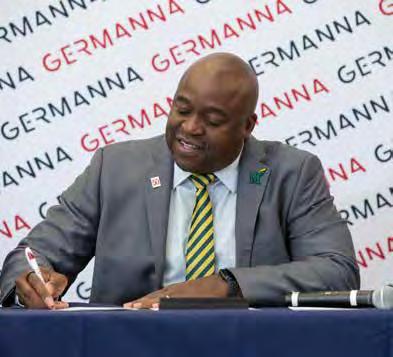
The Mason Academy program, which is both part of MVP and an extension of the university’s successful ADVANCE

With the new Mason Virginia Promise program, the university is increasing the pathways to success for many Virginians
PHOTOS BY BC PHOTOGRAPHY Summer/Fall 2022 MASON SPIRIT | 31
President Washington chats with incoming Mason student Amara Zavala, who plans to pursue a bachelor's degree in forensic science.
program partnership with Northern Virginia Community College (NOVA), will be available at Virginia community colleges. The Mason Academy at Germanna is the first to launch. Another partnership with Tidewater Community College is expected to start later in 2022.
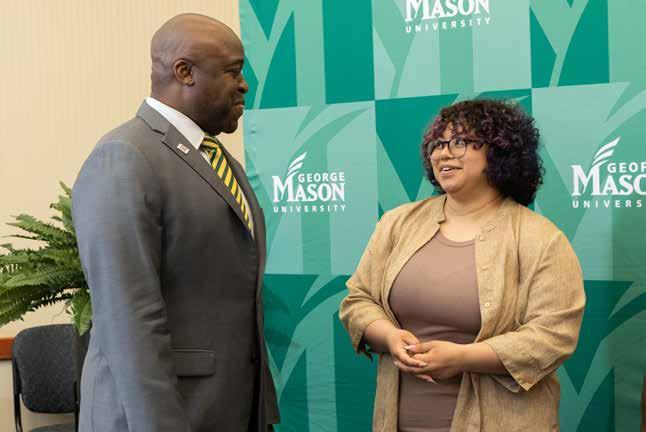
McDonnell, who is a first-generation college student, recently completed his associate’s degree in business administration at GCC and is pursuing a bachelor’s degree in information technology at Mason through the new academy. A help desk technician for the Thomas Jefferson Foundation at Monticello in Charlottesville, Virginia, he says he chose information technology as his major to fur ther his career and because it is an online program.
“I am located a couple hours from the university, but I didn’t want to let the distance stop me from choosing Mason,” says McDonnell, who was also accepted to four other schools. “I haven’t picked a concentration yet, but I am thinking about either cybersecurity or programming. And I am hoping that Mason can help me achieve my goals.”
The goal for the new GCC Mason Academy is for Mason and GCC to work together to remove bar riers for students by providing streamlined, guided academic pathways with strong support for students along the way—much like the model Mason created with NOVA through ADVANCE. Students enrolling in the academy experience a one-time admissions and financial aid process, enjoy significant cost savings, and have access to additional grant pro grams. As part of the financial aid, Mason will also reimburse tuition and fees for Mason Academy transfer students who have met other grant-based scholarship and family household income level requirements. In addition, academy students have a dedicated academic advisor for their entire college journey to ensure success with no loss of credits.
“Germanna and George Mason are both committed to bringing higher education within reach of every Virginian. Earning an associate’s degree at GCC makes the pursuit of a bachelor’s degree more affordable,” says Gullickson. “And the new Mason Academy offers Germanna graduates a pathway and a supportive bridge to a bachelor’s degree at a top university.”
New Mason community health major Michele Adjei-Fah was also present at the June signing event. She is pursu ing a second bachelor’s degree through the academy after completing her general studies pre-bachelor of science in nursing at GCC. Born in Liberia to Ghanaian parents, Adjei-Fah earned her first bachelor’s degree in social sci ences from Kwame Nkrumah University of Science and Technology in Ghana and has only lived in the United States for the past five years.
PHOTOS BY BC PHOTOGRAPHY
32 | 50TH.GMU.EDU
According to the National Student Clearinghouse Research Center, 80 percent of students attending community colleges say they want to earn a four-year degree, but in 2020, only 30 percent succeeded in transferring to a four-year institution. The 2021 update shows that lower-income students were half as likely as their higher-income peers to transfer to a four-year institution and attain a bachelor’s degree within six years of their first entry to a community college.
Adjei-Fah, who lives in Fredericksburg, says she was attracted to Mason because of its diversity and because “everyone is welcome here.” After working for 10 years in environmental health sciences as a social scientist, AdjeiFah aspires to work in the health sector and hopes to one day get her PhD.
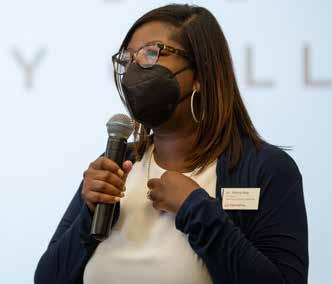
“Growing up in a war-torn country and living in West Africa as a refugee, I’ve seen the effects of abject poverty and poor health conditions,” she says of choosing commu nity health as her major. “This inspires me and motivates my passion for medical research and to give back to society.”
Grant Davis, another GCC graduate joining Mason, is also focusing on his long-term goals and how Mason can help get him there.
“I plan to attain at least a master’s degree and work toward my goal of being a mayor, city manager, or other local offi cial,” says Davis, who is pursuing a public administration bachelor’s degree at Mason. “This decision isn’t a change from what I’ve been previously studying at Germanna Community College, as I focused on political science elec tive courses as I worked on my Liberal Arts AA&S, but it is a monumental step in my educational career.”
However, unlike many of the students in the Mason Academy, Davis plans to relocate to Northern Virginia
Calling All Entrepreneurs
from Spotsylvania to take classes and is eager to join his friends on campus.
“I am excited to live in an apartment with some friends and attend classes on campus,” says Davis, who has friends who started at Mason as freshmen. “Being a transfer student, it will be challenging at first to navigate [the] Fairfax Campus and its resources, but I look forward to finally living the full college experience.”
Tiffany Ray, GCC's vice president of student services, spoke at the launch about the new program.
For those looking to start their own business, the Mason Virginia Promise also includes training and financial support for all Virginians through Mason Enterprise’s suite of entrepre neur and small business programs, including 27 Small Business Development Centers, five Northern Virginia technology incubators, the Procurement Technical Assistance Center, and other federal, state, and local support programs.
Last year, the Mason Enterprise team advised and supported 11,000 small businesses with 42,000 hours of one-on-one counseling. In addition, 20,000 entrepreneurs took part in 753 no-cost or low-cost training programs. Mason’s entrepreneur and small business programs have made a $1.6 billion impact in the commonwealth.
Summer/Fall 2022 MASON SPIRIT | 33
George Mason University’s new Meditation Garden and Labyrinth can be found on the Fairfax Campus between Horizon Hall and the renovated Harris Theatre on the former site of Robinson Hall.

The garden and labyrinth are meant to provide the Mason community with a peaceful place for contempla tion and relaxation in the heart of campus. According to Nance Lucas, executive director and chief well-being officer at Mason’s Center for the Advancement of WellBeing, the garden connects to the university-wide goal of Mason evolving as a model well-being university.
“We want well-being to be in the DNA of this institution, and this garden is symbolic of it,” Lucas says. “It also sup ports the research on the benefits of being in nature and meditation.”
The garden—which is filled with purple coneflowers, black-eyed Susans, creeping phlox, and purple aster flowers—allows individuals to experience a calming atmosphere while studying, walking, or relaxing.
—Pam Shepherd
PHOTO
BY
EVAN CANTWELL
34 | 50TH.GMU.EDU

Summer/Fall 2022 MASON SPIRIT | 35
INQUIRING MINDS
Frequently Asked Questions about Monkeypox
In July 2022, the World Health Organization declared that the global monkeypox outbreak was a public health emergency of international concern, and in August 2022, monkeypox was declared a public health emergency in the United States. The monkeypox outbreak is still spreading at unacceptable levels globally and nationally. With colleges and schools back in session, monkeypox has a new opportunity to potentially infect more people.
George Mason University epidemiologist Amira Roess specializes in infectious diseases, especially reducing the transmission of diseases that originate through animal-human contact, including monkeypox. Roess first studied monkeypox while serving as an epidemic intelligence service officer at the Centers for Disease Control and Prevention in 2008.
Is monkeypox a sexually transmitted infection?

No, monkeypox is not considered a sexually transmitted infection, meaning that sex is not the only way that you can get monkeypox. The virus spreads through close skinto-skin physical contact and through contact with bodily fluids from an infectious person. This type of contact is not limited to sexual activity.
Anyone can get monkeypox. In the United States, we’re seeing that there are a lot of cases and transmission among men who have sex with men. Though we’re not seeing signifi cant transmission outside of that group, we are seeing cases in nonsexual contacts and in children. It is important to remem ber that anyone can get monkeypox. In the United States, we have seen more than 30 cases in children.
How does monkeypox spread?
Monkeypox spreads through close physical contact with someone who is infected, their bodily fluids, or with bedding, linens, towels, or similar material that an infected individual has come in contact with. Sex is one way to have close physical contact with someone, but the virus can also spread from close dancing, hugging, or any other close skin-to-skin contact.
What are the signs and symptoms of monkeypox?
The symptoms can vary. Within three weeks of exposure, many people have a fever, headaches, and/or body aches. Often, they’ll have swollen lymph nodes. Typically, individuals with monkeypox will also develop a rash that looks like pimples or pox lesions, and it is often found in the areas where that initial skin-to-skin contact or exposure may have occurred.
How can individuals prevent the spread of monkeypox?
You can reduce your chances of catching or spreading mon keypox by reducing the number of individuals that you have close personal contact with. Think through what exposures you might have in your everyday life. Have you had close physical contact with someone who is at risk of monkeypox or who has been recently exposed? If so, consider getting the monkeypox vaccine.
If you get monkeypox, you can reduce the chance of spreading it by isolating and immediately notifying anyone you might have had close contact with so that they can also take precautions.
—Mary Cunningham
This information is accurate as of September 8, 2022. Details about monkeypox continue to evolve as researchers study the disease. Learn more at bit.ly/monkeypoxfaq.
GETTY IMAGES
36 | 50TH.GMU.EDU
The Invasion of the Body Snatchers—in the Chesapeake Bay!
They’re creepy and they’re spooky, mysterious and ooky—they are zombie crabs, and what’s happened to these tiny estuarine mud crabs is the stuff of nightmares and horror movies.
The white-fingered mud crabs and their short lives at the mercy of two diabolical parasites are the focus of research being conducted at George Mason University’s Potomac Science Center. Amy Fowler, assistant professor of invertebrate ecology, aquatic ecology, parasitology, and invasions—yes, you read that right—leads the research, working with Environmental Science and Policy graduate students Darby Pochtar and Sarah Greenberg and several Office of Scholarship, Creative Activities, and Research (OSCAR) students.
One parasite, a rhizocephalan barnacle, grows root-like structures inside the crabs, eventually castrating them. It even erupts through the abdomen of the crab, just like in the movie Alien, creating a mass on the crab’s underside that is pure parasite.
“We call it a zombie crab at this point because they are essentially no longer part of the crab population,” says Pochtar, who is working on a PhD in environmental science and public policy. “They are only producing more parasites.”

And the parasite is good at what it does, says Fowler. The infected crab zombies serve as vessels for the barnacle’s reproduction, providing the parasite with a mobile host.
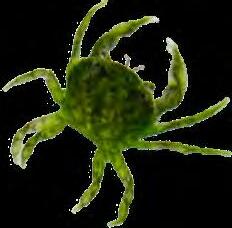

The second parasite that Fowler’s team is investigating is an isopod parasite related to a roly-poly,
or pill bug. However, Greenberg and Pochtar have found that, in the mud crabs, this parasite no longer resembles its terrestrial cousin, but rather looks more like a mucus blob.
“There’s not a lot of literature on isopod parasites,” says Greenberg, who is working on an MS in environmental science and public policy. “They haven’t been documented in this host in the Chesapeake Bay, so a lot of the work that Darby and I are doing is trying to figure out what this parasite is.”
While people don’t eat the small mud crabs, Fowler and other researchers are thinking of how parasites can wreak havoc on the food chain and potentially commercial fisheries. That would truly be a nightmare, especially for the Chesapeake Bay.

“I think the big story here is invasions—the movement of organisms from one place to another, and what happens next,” says Fowler, who teaches in the Department of Environmental Science and Policy in Mason’s College of Science. “Part of our work is investigating the invasion of the barnacle parasite from its native range in the Gulf of Mexico to the Chesapeake Bay and how that has negatively impacted crab populations.”
PHOTO BY SHELBY BURGESS
—Colleen Kearney Rich, MFA ’95
Summer/Fall 2022 MASON SPIRIT | 37 RESEARCH
INQUIRING MINDS
Fulfilling Critical Public Health Needs
George Mason University has established the Mason Center for Health Workforce to address the shortage of and immediate need for health workers in Virginia. Directed by P. J. Maddox, professor and chair of Mason’s Department of Health Administration and Policy, and Caroline Sutter, MSN ’01, DNP ’12, the center will support the development and delivery of public-private strategies to optimize education for physical and behavioral health careers and post-graduate skills training.
The center will also serve as a technical assistance center for health workforce research, program evaluation, and planning and analysis for government agencies, academic entities, and professional organizations.
The center will build on work currently funded by the Claude Moore Community Foundation for early health workforce development, supporting the Claude Moore Scholars program and providing technology and services that enhance existing education and training pathways to employment programs in Virginia.
The Claude Moore Scholars program, which works with 46 school systems in Virginia, is designed to introduce young people to health care careers and help them get the necessary education and training that will enable them to enter meaningful jobs upon completion of high school.
“A competent health workforce is a critical asset for fielding essential health and public health services in all communities,” says Maddox.
POINT of PRIDE
George Mason University has received a combined $3.75 million, three-year grant to establish Nano-IMAGINE, a new program created in response to the fast-growing nanofabrication industry and the driving force behind Mason’s construction of a new Nanofabrication Facility on its Science and Technology Campus in Manassas.
NOAA Taps Mason Scientists to Update Drought Prediction Models

The National Oceanic and Atmospheric Administration (NOAA) is working with a group of George Mason University scientists to update its drought forecasting system. The researchers leading this effort are all from Mason’s Center for Ocean-Land-Atmosphere Studies (COLA), which is known for its decades of experience running these types of models.
Mason climate systems scientist Paul Dirmeyer is working with col leagues Bohua Huang and Chul-Su Shin to understand the ways in which the ocean and land interact with the atmosphere and how each contributes to predicting droughts in the United States. Their work is funded by a three-year $510,000 grant from the NOAA Climate Program Office’s Modeling, Analysis, Prediction, and Projection (MAPP) program.
Weather models are known to reliably predict the weather one week out and provide seasonal outlooks. However, there is much less reliability in between those periods, called “subseasonal.” Dirmeyer and the team aim to improve this reliability by focusing on the interplay between atmosphere, land, and ocean while analyzing current model behaviors and working to improve the technology’s accuracy at drought forecasting.
“The atmosphere evolves quickly, so predictability is lost quickly, which is why weather forecasts beyond a week are usually not as useful,” says Dirmeyer, who is also a professor in the Department of Atmospheric, Oceanic, and Earth Sciences in the College of Science. “This is why we want to look to ocean and land and better incorporate their interactions into prediction models.”
The NOAA Unified Forecast System (UFS), currently under development, is also being evaluated and used for sensitivity studies to explore specific U.S. drought cases. The team has already reforecast weather from 1958 to 2017 to test the current prediction model’s ability to predict droughts. Instead of relying on data provided to them by others, the Mason team is testing the UFS model themselves until they are confident in its validity.
“There is a pressing need to address the drought prediction problem and improving models that incorporate more information from land and ocean conditions is a crucial part of the solution,” Dirmeyer says.
—Laura Powers
ILLUSTRATION AND PHOTO BY GETTY IMAGES 38 | 50TH.GMU.EDU
Improving Mental Health Responses in Public Safety
George Mason University’s Center for Evidence-Based Crime Policy (CEBCP) has been awarded $1.48 million in federal funds to enhance research and practice in police encounters with individuals in mental health crises.

Led by CEBCP senior fellows Sue-Ming Yang and Yasemin Irvin-Erickson, the research involves collaborative efforts with the Prince William County and Roanoke County police departments to enhance the capacity of policing mental health problems in Virginia. The coalition also includes the Roanoke City, Salem, and Viton police departments, each of which is also working toward implementing a co-responder model to assist people who are experiencing a mental health crisis.
“Law enforcement officials are routinely challenged about how to best respond and assist individuals experiencing a mental crisis—with the number of such encounters rapidly increasing,” says Mason provost Mark Ginsberg. “This initiative will provide valuable training and associated resources that will assist officers as they respond and can be a catalyst for supporting those in crisis—both of which will be of significant benefit.”
The funding, which was part of the omnibus appropriations bill, resulted from efforts by U.S. Senators Tim Kaine and Mark Warner in support of the proposal. It will be used to support research and training on diverting individuals with mental health disorders from criminal justice contact and prepare officers to respond to mental health-related crises in Virginia.
“These additional tools come at a critical time as police departments and their partners struggle to keep their communities safe while also minimizing officer use of force in these situations,” Yang says. “A co-response team provides a more person-centered and trauma-informed approach to mental health-related incidents.”
CEBCP director Cynthia Lum emphasized that the effort will continue long-standing research partnerships that the CEBCP faculty have with Prince William County and Roanoke County.
“These partnerships sharpen our research on effective public safety interventions for those in crisis and continue to showcase the practical impact that Mason has in the commonwealth,” Lum says.
—John Hollis
POINT of PRIDE
Distinguished Professor David Weisburd has been selected by the Cambridge University Police Executive Program as the tenth winner of the Sir Robert Peel Medal for Outstanding Leadership in Evidence-Based Policing. Weisburd is the first university professor to receive the medal. Weisburd, who is the executive director of Mason’s Center for Evidence-Based Crime Policy and who also holds an appointment as the Walter E. Meyer Professor of Law and Criminal Justice at the Hebrew University Faculty of Law in Jerusalem, is well known for his innovative work in placebased criminology, experimental criminology, and white-collar crime.
In January, Weisburd was awarded the prestigious Israeli Rothschild Prize in social sciences. This is the first time the prize has recognized a criminologist.
 PHOTO BY CREATIVE SERVICES
PHOTO BY CREATIVE SERVICES
PHOTO BY GETTY IMAGES Summer/Fall 2022 MASON SPIRIT | 39 RESEARCH
Media and Public Relations Research in Post-Socialist Societies
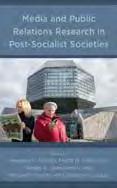
Sergei Samoilenko, co-editor, assistant professor, Communication
Rowman & Littlefield, March 2021
This collection tracks the birth, development, and contemporary expansion of communication research, with a focus on public relations and media research in post-socialist societies.
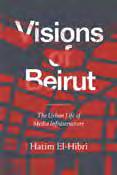
The Handbook of Strategic Communication
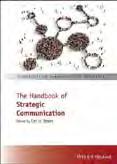
Carl Botan, professor, Communication Wiley, April 2021
Designed to provide an understanding of strategic communication across subfields, this handbook brings together work from leading scholars and practitioners in the field to explore the many practical, national, and cultural differences in modern approaches with a range of international practices, current theories, and contemporary debates and issues in this multidisciplinary field.
The Moving Body and the English Romantic Imaginary
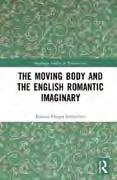
Kristin Samuelian, associate professor, English
Routledge, May 2021
The book explores ways in which England in the Romantic period conceptualized its relation both to its constituent parts within the United Kingdom and to the larger world through discussions of dance, dancing, and dancers, and through theories of dance and performance.
The Fires of Philadelphia: Citizen-Soldiers, Nativists, and the 1844 Riots Over the Soul of a Nation
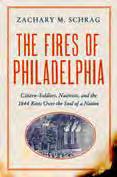
Zachary Schrag, professor, History and Art History
Pegasus Books, June 2021
In 1844, Philadelphia was set aflame by a group of Protestant ideologues who were seeking social and political power while rallied by charisma and a fear of immigrants. At a time
when many envision America in flames, this book shows a city—one that embodies the founding of our country—that descended into open warfare and found its way out again.
The Economics of Conflict and Peace: History and Applications
Christopher Coyne, professor, Economics, with Shikha Silwal, Charles Anderton, Jurgen Brauer, and J. Paul Dunne
Cambridge University Press, June 2021
Written for students, general readers, and economists alike, this volume is a primer on the field of the economics of conflict and peace.
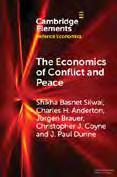
It offers a comprehensive, systematic, and detailed overview of the field’s orthodox and heterodox history of thought and current theories and evidence.
Visions of Beirut: The Urban Life of Media Infrastructure
Hatim El-Hibri, assistant professor, English Duke University Press, June 2021
Drawing on fieldwork and texts ranging from maps, urban plans, and aerial photographs to live television and drone camera footage, El-Hibri traces how the technologies and media infrastructure that visualize the city are used to consolidate or destabilize regimes of power. Outlining how Beirut’s urban space and public life intertwine with images and infrastructure, El-Hibri interrogates how media embody and exacerbate the region’s political fault lines.
Dying to Learn: Wartime Lessons from the Western Front

Michael Hunzeker, assistant professor, Schar School of Policy and Government Cornell University Press, July 2021
Focusing on historical context, this book exam ines German, French, and British armies during the First World War. Keeping note of the impor tance of assessment, command, and training, Hunzeker develops a novel theory to provide solutions to how modern military organizations can learn and adapt amid intense wartime.
Recently published works by Mason faculty
SHELF LIFE 40 | 50TH.GMU.EDU
Serious Games in Personalized Learning: New Models for Design and Performance
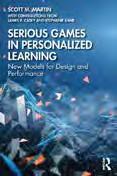
Scott M. Martin, professor, and James Casey, associate professor, Computer Game Design, and Stephanie Kane, BA History ’08, MA Computer Game Design ‘21
Routledge, July 2021
This book synthesizes contemporary research, frameworks, and models centered on the design and delivery of serious games to provide a comprehensive guide to the history, practical implications, and data-collection potential inherent to these fast-evolving tools.
Securing the MRAP: Lessons Learned in Marketing and Military Procurement

James Hasik, senior research fellow, School of Business
Texas A&M University Press, August 2021
In this volume, Hasik explores how mine-resistant ambush protected (MRAP) vehicles, which the American military mostly rejected despite the great need for them, eventually came to be adopted as the Pentagon’s top procurement priority. Hasik traces the story of the MRAP from the early 1970s to the future of mineresistant vehicles on the battlefields of tomorrow.
The Art of Insubordination: How to Dissent and Defy Effectively Todd Kashdan, professor, Psychology
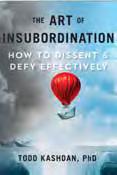
Avery Publishing Group, August 2021
This guidebook is for anyone seeking to be heard, make change, and rebel against a status quo. The book provides evidence-based strategies to ensure that the best ideas, products, and solutions survive.
GETTING UNSTUCK
Victoria Grady, an associate professor of management and organizational behavior in Mason’s School of Business, has focused her research on organizational change. In her latest book, Stuck: How to WIN at Work by Understanding LOSS (Productivity Press, 2022), written with Mason adjunct professor Patrick McCreesh, Grady delves into 20 years of research on how people—and their brains—react to change in the workplace and beyond.
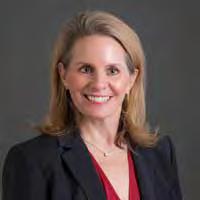
What inspired you to write this book?
The origin of my interest in the topic spans 20 years. After living in the southern and northeast United States and Germany, I noted very similar reactions from my students who were experiencing change based on a new technology integration. What was most notable is that regard less of age, demographic, socioeconomic, or cultural differences, most people responded to the change [in a way] that was generally similar.
It varied from person to person and organization to organization, but it was too similar to ignore. In 2012, I published a book called The Pivot Point: Success in Organizational Change, which was basically a one-story example with an overview of the science that supported the story. As the research evolved, we realized that the 2012 publication needed to be expanded beyond just describing the behavioral response to change to also include more examples and a much more detailed strat egy to understand what I like to refer to as the “beneath the surface” aspect of organizational change.
There is a lot of psychology in this book. Is understanding people a crucial part of managing them?
There is a lot of psychology—I think it can seem very heavy. That is why we use the story-based examples at the beginning of each chapter. We think that makes the other “heavy” text much more relatable. We probably spent at least 100 hours just talking through the examples, observations, and case studies from our experiences to capture the most relatable stories for the book. And, yes, unequivocally, I believe that understanding your people at their most basic behavioral instinct is critical to effectively and fairly managing them.
Do you think we are more “stuck” now after the pandemic?
Are we more “stuck,” or are we just more aware of it? I am not sure. What I will say is that I think we have all experienced a huge amount of unanticipated change. I think it is hard—and honestly, we have a long way to go—not necessarily with COVID-19 per se, but with the aftereffects on our behaviors. As I noted at a conference earlier this year, the behavior change we experienced was massive. And, not to state the obvious, but we will not just snap back into pre-pandemic behaviors, perceptions, and attitudes. It is going to take time.
—Colleen Kearney Rich, MFA ’95
Summer/Fall 2022 MASON SPIRIT | 41
The Black Civil War Soldier: A Visual History of Conflict and Citizenship
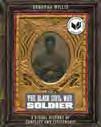
Deborah Willis, PhD Cultural Studies ’01
This book (NYU Press, January 2021) compiles the oft-forgotten stories of African Americans in the Civil War through photographs, letters home, and other intimate ephemera to address themes of love, patriotism, and African American resilience.
Willis is a renowned historian and photographer. She is a professor and chair of the department of photography and imaging at New York University’s Tisch School of the Arts.
The Ladies of the Secret Circus
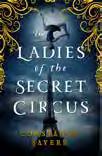
Constance Sayers, MA English ’98
Sayers’s second novel (Redhook/Hachette, March 2021) spans Jazz Age Paris to modern-day Virginia in a decadent and magical tale of family secrets and lost love set against the backdrop of an extraordinary circus.
Sayers lives in Alexandria, Virginia. She is the president of GovExec, a media and information company.
Dedicated to My Muse and Other Inspirations
Heath Gertner, BA History ’93
This poetry collection (Author House, April 2021) is the culmination of the author’s effort to honor his mother’s memory, as she, more than anyone else, had urged him to move past his doubts and simply create.
Pregnant Girl: A Story of Teen Motherhood, College, and Creating a Better Future for Young Families

Nicole Lynn Lewis, MPP ’06
This memoir (Beacon Press, May 2021) , based on the author’s struggles as a teen mother, shares a new perspective on how poverty, classism, and systemic racism impact teen pregnancy and addresses the way effective programs and policies can help teen parents.
Lewis is an activist and speaker who founded Generation Hope, a nonprofit that supports teen mothers and their children in college and kindergarten. Lewis lives with her husband and their four children in Maryland.
Last Train to Auschwitz: The French National Railways and the Journey to Accountability Sarah Federman, PhD Conflict Analysis and Resolution ’15 After World War II, the French National Railways was celebrated for its acts of wartime heroism. More recently, debates and litigation have revealed how the system was complicit in the deportation of tens of thousands of Holocaust victims. In this book (University of Wisconsin Press, May 2021), the author delves into the interconnected roles—perpetrator, victim, and hero—the company took on during the Holocaust.

Federman is a Fulbright specialist in peace and conflict and teaches as an assistant professor of negotiation and conflict management at the University of Baltimore.
Free to Thrive Ben Bennett, BA Art and Visual Technology ’12
In Free to Thrive (Thomas Nelson, August 2021), Bennett and coauthor Josh McDowell present biblical teaching,


recent neuroscientific research, personal stories of deliverance, and practical tools to overcome unhealthy behaviors
Bennett is an author, speaker, and director of the Resolution Movement, which helps individuals work through the factors driving the unhealthy patterns in their lives.
LOOK: How a Highly Influential Magazine Helped Define MidTwentieth-Century America
Andrew L. Yarrow, PhD ’06
Yarrow tells the story of Look magazine (University of Nebraska Press, November 2021), one of the greatest mass-circulation publications in American history, and the very different United States in which it existed.
Yarrow has been a reporter for the New York Times, a professor of American history, and has worked in public policy in both the government and nonprofits. He writes frequently for many national media outlets and is the author of five books.
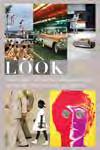 Recently published works by Mason alumni
Recently published works by Mason alumni
ALUMNI IN PRINT 42 | 50TH.GMU.EDU
Andrew Joseph White
George Mason University MFA candidate Andrew Joseph White, BFA ‘19, says he wanted to tell stories even before he knew how to form letters. White’s first young adult (YA) book, Hell Followed with Us, an LGBTQ post-apocalyptic horror story, came out in June 2022. Now a New York Times bestseller, the novel was an American Booksellers Association Winter/Spring 2022 Indies Introduce title and received an American Library Association Booklist Starred Review and starred write-up in Kirkus Review
JOURNEY TO PUBLICATION: White chose Mason because its cre ative writing program is more accepting of genre fiction than many others. This was especially important for the MFA, because White’s application consisted of the first chapters of what would become Hell Followed with Us. White started writing the novel in his senior year at Mason and signed with Peachtree Teen in early 2021 as one of the new imprint’s first three books. While at times White simply had to trust the process, Peachtree Teen’s small team impressed him. He says now he was glad to debut with an up-and-coming press before working with a larger publisher where authors may have less control.
DARKER THAN FICTION: White has been deeply fascinated by monsters since he was very young. He connects this with the fact that unrecognized gender dysphoria and undiagnosed autism can make individuals feel like they are not entirely human. White’s debut novel coincides with legislation in multiple states seeking to severely curtail trans people’s rights. In this environment, White’s story, which acknowledges how life sometimes seems to require monstrous actions to survive, is one he feels that a lot of LGBTQ kids need. Hell Followed with Us is also a way to provide young trans readers something he never experienced growing up—a YA trans protagonist. “The whole point of the book is telling queer kids that
you can make it out of hell alive. You might not be in one piece; you might not be okay. But you are still alive.”
YEAR: Graduate Student MAJOR: Creative Writing HOMETOWN: Winchester, Virginia
EXPANDING REPRESENTATION: In addition to a trans pro tagonist, Hell Followed with Us features an autistic character, Nick, as the secondary lead and love interest. White empha sizes the need for autistic YA characters who readers can take seriously and look up to. When White began research to ensure the character was an accurate depiction of autism, he realized how much of what he was reading applied to his own experience. This led White to base Nick on a version of himself, and the process has allowed him to embrace his ability to write characters who are both authentically trans and autistic.
LOOKING AHEAD: White says he would love to win a Lambda Literary Award or Stonewall Book Award one day, and he already has more LGBTQ YA horror novels and an adult novella in the works. When White is not writing, he likes to play horror video games, which are another source of inspira tion for his stories; read work by queer YA fiction contempo raries; and spend time with his cat.
 PHOTO BY SIERRA GUARD
—Rebecca Kobayashi
PHOTO BY SIERRA GUARD
—Rebecca Kobayashi
PATRIOT PROFILE Summer/Fall 2022 MASON SPIRIT | 43
Principal Amy Schott greets her Henderson Elementary students as they arrive in the morning.
Principal of the Year Leads by Example
A my Schott, MEd Education Leadership ’06, says being a principal is the “best of all worlds.”
“I love actively engaging with everyone each day to support the success of all students,” says Schott, who is principal of Henderson Elementary School in Woodbridge, Virginia.
In April, Schott was chosen as the Washington Post’s 2022 Principal of the Year from 14 finalists in Virginia, Maryland, and Washington, D.C. Schott became principal of Henderson in September 2021, having previously served as principal of Rockledge Elementary, also in Prince William County, for 13 years.

Carolyn Renk, a special education teacher at Henderson, says that what makes Schott special is how she fosters a positive school environment.
“She encourages teachers to be open and honest with her and each other to make the best decisions for students,” Renk says. “On the morning announcements each day, Amy tells students, ‘You are loved at Henderson, and you belong here.’ Hearing this message daily helps students and teachers feel a wonderful sense of community.”
Growing up, Schott vacillated between two careers— working with children and becoming an airline pilot. “At the end of high school, I chose to go into education. It’s a decision I don’t regret.”
Schott received her bachelor of science degree in early childhood education from Texas Christian University, then moved to Virginia to be near her brother.
“He said, ‘Come to Virginia. It’s like Minnesota without the lakes,’” Schott says. “I always thought it was so funny because I learned that Virginia is nothing like Minnesota after I actually moved here.”
Schott established roots in the area, marrying and having two children. She began teaching English as a second language, as well as third-grade students, ultimately moving into administration.
Her Mason experience as an education leadership major helped prepare Schott for a variety of challenges and experiences. Schott keeps in touch with members of her Mason cohort. “It was a chance to meet with aspiring leaders in the same boat, work with them, and get to know them,” she says. “We established collegial professional relations that benefited us well past graduation.”
Schott enjoys mentoring other principals and helping them navigate both work and family, as she has learned to do through the years. “It’s a joy of mine to be able to help other principals and advocate for them.”
—Anna Stolley Persky
“It’s a joy of mine to be able to help other principals and advocate for them.”
PHOTO BY EVAN CANTWELL
class notes 44 | 50TH.GMU.EDU
1960s
Helen Regina Gleason White, BA English ’69, is president of the American News Women’s Club, head quartered in Washington, D.C., and charged with expanding the advance ment of women in jour nalism and the media professions, among other missions. She retired from the U.S. Department of State under Secretary Madeleine Albright in 1997.
1970s
Jim McCarthy, BS Public Administration ’75, received his juris master degree in the spring from the Florida State University College of Law. He is president of North Florida Land Trust and a member of the Florida Environmental Regulation Commission.
Wayne Spencer, BS Biology ’76, retired from Johnson and Johnson Surgical Vision on October 22, 2021. He resides in Lake Oswego, Oregon.
Robert Deuell, BS Biology ’78, a former member of the Texas State Senate, was appointed chief medical officer and vice president of medical affairs for Hunt Regional Medical Center in Greenville, Texas. A med ical doctor with a degree
from the Medical College of Virginia, he continues to practice family medicine part time in Greenville.
1980s
Sandra L. Kearse-Stockton, BS Nursing ’81, is the author of a three-book series, 480 Codorus Street. The first and second books—Surviving Unpredictability and Trials and Tribulations—are cur rently available and the third book is forthcoming. Kearse-Stockton spent more than 30 years as a nurse in the U.S. Army and Department of Defense and at a veterans hospital.
Marc Rogoff, JD ’81, has served as attorney for the Woodbridge Township Planning Board for more than 30 years. He lives in Scotch Plains, New Jersey.
Christel Vilogron, BA International Relations ’81, is a consultant working in the global trade field. Her professional experience includes work creating and directing global trade compliance departments in five global corporations in Southern California and Silicon Valley. She was appointed to the U.S. District Export Council of Southern California by the U.S. Secretary of Commerce and also was appointed vice chair of Orange County, California.
Padraic Manion, BS Marketing ’82, retired in December 2021 after a 34-year career with USAA. He resides in Kihei, Hawaii.
Jeff Platenberg, BS Public Administration ’85, is the superintendent of schools for the City of Fairfax. He was selected for the posi tion by the City of Fairfax School Board, and his tenure began on June 30. Previously, he was the assistant superintendent for facilities and transportation services at Fairfax County Public Schools, the largest school system in Virginia.
Denise Fleenor Spenik, BA Studio Art ’85, earned a National Board Teaching Certification in Elementary Art from the National Board of Professional Teaching Standards. She teaches art at Fireside Elementary School in the Paradise Valley School District in Phoenix, Arizona. She is a former four-year member of Mason’s cross-country and track and field teams.
1990s
Reza Khadiri, BSEd Health Education ’92, recently was named to the 2022 Forbes Best-In-State Wealth Advisors list for Washington, D.C. A wealth management financial advisor at Merrill Lynch, Khadiri focuses on assisting a select group of families with the manage ment of their financial lives. He holds the Chartered Retirement Planning Counselor and Certified Plan Fiduciary Advisor pro fessional designations.
Harlan Sands, JD ’94, was named a 2021 Newsmaker of the Year by Crain’s Cleveland Business. Sands, president of Cleveland State University (CSU), was recognized for spearhead ing CSU’s recent accom plishments, including serving as Ohio’s largest mass vaccination site, which administered more than 365,000 vaccinations during the pandemic. Sands established an ambi tious plan to grow the
university through its mis sion of access and afford ability, and partnered with the Cleveland Clinic, Case Western Reserve University, and others to create a Cleveland Innovation District around medicaland technology-driven employment pathways and research. Sands has served as CSU president since June 2018.
Fred Jorgensen, BA International Studies ’95, is vice president of strategic growth at Bixal, a leading provider of human-centered design and customer experience for mission-driven organi zations. He is also a parttime faculty member in the Busch School of Business at the Catholic University of America and lives in Ellicott City, Maryland.
Frances Robin, BA Government and International Politics ’95, received a Human Rights Award from the Prince William County Human Rights Commission for her work with Carried To Full (continued next page)
What’s New with You?
We are interested in what you’ve been doing since you graduated. Moved? Gotten married? Had a baby? Landed a new job? Received an award? Submit your class notes to alumni.gmu.edu/whatsnew. In your note, be sure to include your graduation year and degree.

class notes Summer/Fall 2022 MASON SPIRIT | 45
class notesclass notes
Hello! I am Christine Landoll, and I am honored to begin my service as your George Mason University Alumni Association president. I look forward to working with our dynamic board of directors, as well as you, our alumni, who devote your time, talent, and treasures to making our alma mater a thriving institution.
I earned my undergraduate degree in 1989 in account ing and my master’s degree in 1992 in taxation. Mason was the catalyst to my professional career, which began at Deloitte in 1990. In 2017, 27 years later, I retired as a managing director and began teaching as an adjunct professor in the School of Business. In 2019, I joined Mason full time as a professor of practice and the direc tor of business engagement. I lead you as an alum and as a faculty and staff member with a firsthand perspective of what a robust alumni network means for the entire university ecosystem.
And although I am the association’s president for the next two years, this is YOUR organization. I look forward to collaborating on how to make our work more relevant to you and how best to engage you in the life of our university. Are you interested in career resources and programming such as networking and mentoring? Are you looking for ways to volunteer and to give back to Mason or the community at large? Are you craving more on-campus social activities that allow you to connect with other alums?
Share your ideas and memories and get engaged to make even more. I have many fond memories of my time on campus, but I know my favorite memory is yet to come. That is what I love about being a Mason alum—it is a lifelong journey that connects you to Mason and its people no matter where you are in the world and at what stage of life.
As we celebrate 50 years of Mason, join me in strengthening your commitment to our university. Together, we will build on the strong foundation of Mason’s first half century and advance the university’s vision and mission into the next 50 years. As President Washington says, “It’s Mason’s Time.” So, let’s get to it, Mason Nation, and move with confidence into the future. As noted above, I know the best is yet to come! How will you answer the call? I look forward to hearing from you soon!
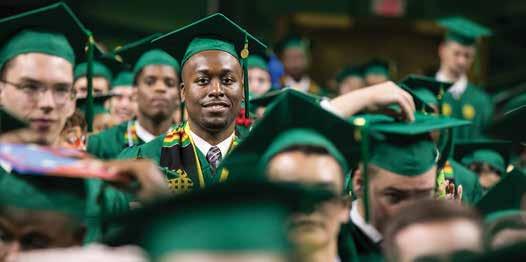
With Patriot Pride, Christine Landoll, BS ’89, MS ’92 President, George Mason University Alumni Association
Term, a nonprofit organiza tion she founded in 2016, which provides long-term housing to pregnant and homeless women. Robin joined the U.S. Army in 1997, and she served as an intelligence analyst from 1999 to 2010. Learn more about her nonprofit at carriedtofullterm.org.

Leslie Stockton, BA English ’95, MEd Curriculum and Instruction ’01, is the first diversity, equity, and inclu sion program manager at a Washington, D.C.-area non profit. She has 25 years of experience in the field.
Kara Borsdam Chandeysson, MS Public Administration ’97, is director of public policy, government affairs, and community engagement for Ting Internet.
Penney Azcarate, JD ’98, a circuit court judge in Fairfax County, Virginia, pre sided over the high-profile Johnny Depp–Amber Heard defamation trial. After earning her law degree, Azcarate was an assistant commonwealth attorney for five years before becom ing a private practitioner. In 2008, she was elected by the General Assembly of Virginia to serve on the General District Court Bench, for which she became the first female chief judge. She has served on the Fairfax County Circuit Court since 2015.
Marc Christensen, MS Electrical Engineering ’98, PhD Electrical and Computer Engineering ’01, became the 17th president of Clarkson University in Potsdam, New York, on July 1. Christensen was previously the dean of the Bobby B. Lyle School of Engineering at Southern Methodist University in Dallas for nine years. He was Mason’s first doctoral grad uate in the newly named electrical and computer engineering discipline, which was formerly known as information technology.
Paul Kelly, BA History ’99, served for seven years (2015–22) on the Three Rivers School District (TRSD) Board in Grants Pass, Oregon. During his tenure, the district gained a more than 25 percentage-point increase in graduation rates across all high schools. In August 2019, he joined Linx Technologies as an inside salesperson and was pro moted to senior accountant in March 2021. In December of that year, he was pro moted to controller. He pre viously was the head coach of the girls soccer team at North Valley High School, resigning in March 2020 to focus on TRSD’s response to the COVID-19 pandemic. He continues to operate Knobs-Etc.com LLC as direc tor of sales and marketing.
PHOTO PROVIDED
(continued on page 48)
46 | 50TH.GMU.EDU
Making a Difference in the Classroom
His own rise against long odds is what fuels Kwabena Konadu, BS Electrical Engineering ’00, MS Telecommunications ’02, every day, and what makes him such an effective educator.
Konadu is a professor of computer science at Northern Virginia Community College’s (NOVA) Woodbridge Campus and the college-wide head of its cybersecurity program.
In March, the State Council of Higher Education for Virginia recognized Konadu for his work with an 2022 Outstanding Faculty Award, one of the most prestigious teaching awards in the state.
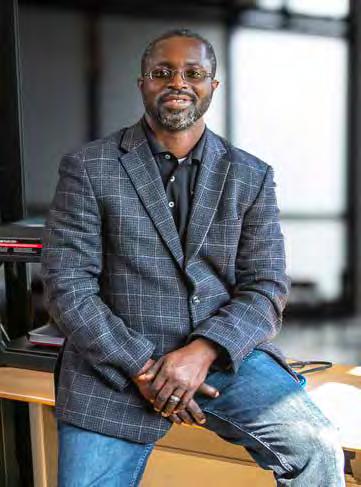
“I come from very humble beginnings,” says Konadu of the award, “So [the recognition] does mean a lot to me because I’ve been spending a significant amount of time helping the next generation of cyber professionals who will help protect our infrastructure.”
Arriving in the United States from his native Ghana at 14, Konadu could barely speak English and had never laid eyes on a computer. His persistence in learning the language and fully immersing himself in education has transformed his life and spurred him to pay it forward.
Initially, Konadu struggled academically, and he credits his teachers for encouraging him to press on. In addition to earning two degrees from Mason, he also holds a degree in physics from Washington College in Maryland.
“Mason really challenged me, but it prepared me for what I’m experiencing right now,” he says.

After completing his degrees, Konadu initially worked as an engineer before pursuing his interest in cybersecurity. In 2008, he began teaching noncredit workforce courses at NOVA, eventually becoming an adjunct professor for the school in 2014 and a fulltime faculty member in 2018.
His dedication to his students knows no limits, as Konadu also coaches the NOVA Cyber Sports team, which was the only community college squad to make it to the 2021 MidAtlantic Collegiate Cyber Defense Competition’s regional qualifying round finals. He sees himself remaining at NOVA for a long time because he believes it’s where he can make the most positive impact.
“This is where you see the kids most in need,” says Konadu. “I’m excited about being able to help guide those kinds of students, prepare them [for the workforce], and help them put food on the table.”
For added motivation, his personal story is among the first things he offers students at the start of each year.
“If I can do it, they can do it,” he says.
—John Hollis
“Mason really challenged me, but it prepared me for what I’m experiencing right now.”
PHOTO COURTESY OF NOVA
ILLUSTRATION BY GETTY IMAGES class notes Summer/Fall 2022 MASON SPIRIT | 47
2000s
Sarah Jean (Sally)
Hanson, BS Biology ’01, is Botswana site director for the Harvard-Botswana Partnership at the Beth Israel Deaconess Medical Center Department of Obstetrics and Gynecology, Division of Global and Community Health. She is responsible for clinical capacity building at the University of Botswana and Harvard Medical School.
Her previous experience includes work with Doctors without Borders; the World Health Organization; mater nal health projects in South Sudan, Nepal, and India; HIV/AIDS public health programs in South Africa and Uganda; emergency health care in Honduras and Cost Rica; and OB/ GYN education in Thailand.
Additionally, she spent more than a decade with the Indian Health Service in the Southwestern United States and Alaska, where
she provided care in a rural setting on the Navajo reser vation, high-risk obstetrics and gynecological care at the Alaskan Native Medical Center and perinatal quality collaboration, simulation, and education; and family planning outreach through out Alaska. She resides in Gaborone, Africa, with her husband and three children.
Torey Carter-Conneen, BA Economics ’05, CERB Accounting ’07, was recog nized by the Washington
Business Journal with a 2022 Business of Pride Award. He is chief executive officer of the American Society of Landscape Architects.
Jonathan A. McElderry, BS Criminology, Law and Society ’06, was named dean of student inclu sive excellence at Elon University, effective July 5. In the position, he leads student-centered initiatives to advance a more diverse, equitable, and inclusive community. Previously,
he was assistant dean of students and executive director of the Intercultural Center at Wake Forest University.
Jason Prokowiew, MFA Creative Writing ’06, received a Contributor Award in Nonfiction for the 2022 Bread Loaf Writer’s Conference. He is work ing on his memoir, Raised by Wolves, and is also the founding attorney of Prokowiew Law.
(continued on page 50)
Christine Landoll, BS ’89, MS ’92, President
Scott Hine, BS ’85, President-Elect
Sumeet Shrivastava, MBA ’94, Immediate Past President
Darcy Kipp Kim, BS ’02, MPA ’20, Vice President, Alumni Engagement
Melissa Lewis, BA ’04, MA ’09, Vice President, Student Engagement
Janay Phillips, BA ’09, Vice President, Volunteerism
Ailsa Ware Burnett, BS ’93, MA ’96, MPA ’08, Vice President, Partnerships and Sponsorships
Cathy Lemmon, BA ’86, MA ’93, Historian
Keith Callahan, BS ’86, Treasurer
Steve Kann, BA ’85, Director-at-Large (2021-23)
Jimmy Martin, BA ’07, Director-at-Large (2021-23)
Molly McLaurin, BA ’08, Director-at-Large (2021-23)
J. Thomas Hennessey Jr., PhD ’97, Directorat-Large (2022-24)
Halleh Seyson, BS ’00, Director-at-Large (2022 24)
Kristen Taylor, BA ’88, Director-at-Large (2022-24)
Deidra Bailey, BA ’09, MEd ’11, President, Black Alumni Chapter
Fitz Shipp, MS ’12, President, Carter School for Peace and Conflict Resolution Alumni Chapter
David P. Brown, PhD ’04, President, College of Engineering and Computing Alumni Chapter
Kathi Huddleston, PhD ’08, President, College of Health and Human Services Alumni Chapter
Cheryl Rice, BA ’98, JD ’91, President, College of Humanities and Social Sciences Alumni Chapter
Mark Monson, BS ’74, President, College of Science Alumni Chapter
Molly Grimsley, BA ‘81, President, College of Visual and Performing Arts Alumni Chapter
Sawyer Dullaghan, BS ’15, President, Green Machine Ensembles Alumni Chapter
Melissa Alberto, BA ’19, President, Honors College Alumni Chapter
Michael D. Marino, BA ’11, President, Lambda Alumni Chapter
Daniel Logroño, BS ’20, President, Latino Alumni Chapter
Brennan Georgianni, MPP ’16, President, Schar School of Policy and Government Alumni Chapter
Pamela Maines, MBA ’09, President, School of Business Alumni Chapter
Chris Jones, MA ’99, President, Veterans Alumni Chapter
Office of Alumni Relations at alumni@gmu.edu.
GEORGE MASON UNIVERSITY ALUMNI ASSOCIATION BOARD OF DIRECTORS 2022–23
If you would like to become involved in the Alumni Association, please contact the
class notes 48 | 50TH.GMU.EDU
Finding Her Place in Public Service
During her time at George Mason Uni versity, India Adams-Jacobs, BS Public Administration ’12, discovered her passion for local government and public service.
“My entire career has been in public service,” says Adams-Jacobs, who is the town manager in Colonial Beach, Virginia. “Everywhere I’ve lived and served, I’ve helped make that community a little better through my work.”
Adams-Jacobs was an International City/ County Management Association Local Government Management Fellow in Albemarle County, Virginia, and Tacoma, Washington, and held positions in several other cities, all of which prepared her for her current job.
In Colonial Beach, Adams-Jacobs oversees the day-to-day operations of the town, its 58 employees, and a budget of more than $8 million. She is leading the implementation of the town’s first strategic plan and is director of emergency management.
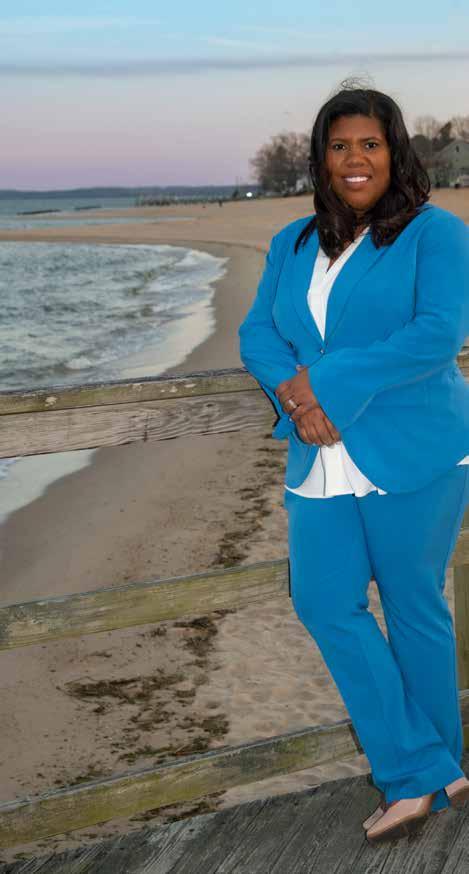
Originally from Bowling Green, Virginia, Adams-Jacobs chose Mason because of the diversity on campus. She loved seeing the flags of different nations in the Johnson Center, and she had roommates and classmates from places such as Morocco and Somalia. She also fulfilled her dream to be a Division I athlete by earning a walk-on spot on the university’s softball team.
Studying abroad in Greece and Turkey further confirmed for Adams-Jacobs that differences are not hindrances to cooperation. “Having these international experiences gave me a broader understanding of how we’re all interconnected,” she says.
Also important to her were classes in the Schar School of Policy and Government. She says one government class taught by former congressmen Jim Moran and Tom Davis focused on how governing really happens “in the middle.”
“While many of my classmates looked to serve at the federal level due to our proximity to D.C., I was drawn to local government because it was closest to the people and where I felt I could make the most direct impact,” she says.
An internship at the county administrator’s office in her native Caroline County added to her certainty.
“I realized I could be involved with anything on any given day, from researching how to retain records through the state library, to figuring out how to work on an insurance claim when a police car hit a deer, to human resources and economic development,” Adams-Jacobs says.
As she studied for her master’s in public administration at Virginia Tech, AdamsJacobs became the first African American selected to serve as the university’s General Assembly Fellow with the president’s office of government relations.
It is a journey that began at Mason. “Mason has everything you would want in an institution,” says Adams-Jacobs, who now serves on the board of Mason’s Black Alumni Chapter. “Faculty and staff that really look out for you, that really care about your well-being and your development as a person who can make a contribution to our global community.”
—Damian Cristodero
PHOTO PROVIDED class notes Summer/Fall 2022 MASON SPIRIT | 49
Keith David Reeves, MEd Education ’06, received the 2022 American Educational Research Association’s Outstanding Dissertation Award in Division H for his work Predictivity of Standard-Based Report Card Models for Standardized Test Scores: A Taxonomic Mixed Methods Study.
Reeves earned his doctor of education degree from Lamar University. He is an administrator at Discovery Elementary School in Arlington, Virginia, the world’s first and only LEED Zero school. He is online at KDReeves.com.
Delia Racines, MEd Curriculum and Instruction ’07, PhD Education ’14, wrote Trust as the Core of Instructional Leadership,
Viacom, Jay Z, and Color of Change and headed social impact at the Instagram platform TheShadeRoom. Find out more about his work at byronledwards.com.
2010s
Robert Gehl, PhD Cultural Studies ’10, co-wrote Social Engineering: How Crowdmasters, Phreaks, Hackers, and Trolls Created a New Form of Manipulative Communication with Sean Lawson of the University of Utah. The book was pub lished in March by MIT Press. The book is open access and chapters are available for download. Gehl is the F. Jay Taylor Endowed Research Chair of Communication at Louisiana Tech University.
Are you an alum who owns a business?
List it in our alumni-owned business directory. Go to bit.ly/masonbiz to find out more.
published by Solution Tree Press in June. She is an administrator, adjunct professor, and a consultant based in Los Angeles.
Byron L. Edwards, BA Communication ’08, is a Los Angeles-based abstract and figurative artist using his “voice to change nar ratives and influence con versations.” Prior to delving into the art world, Edwards had a successful career in entertainment as a publi cist, where he worked with
Jerry Holy, BA Integrative Studies ’10, competed in June at the 2022 Special Olympics Games in Orlando, Florida, as part of Team Virginia H2O Wizards swim team. There, he competed against other Special Olympians from across the United States and the Caribbean. He is a data management specialist at the Special Olympics Unified Champion Schools.
Amanda Rowley Paone, MA History ’10, and Thomas Paone, MA History ’10, welcomed Emma Juliet in January 2021. Thomas was the featured curator on the TV program America’s Lost Airship: Weapon of War on the Smithsonian Channel. He is the curator of the Lighter than Air collection at the Smithsonian National Air and Space Museum.
Terri White, MA Arts Management ’11, is pres ident and chief executive officer of the Charlotte Museum of History, the first African American in the position. Her previous experience includes work in development and oper ations at the Heinz History Center and the Carnegie Science Center, both in Pittsburgh, and at the Smithsonian Institution National Air and Space Museum in Washington, D.C. She is also pursuing a doctorate in the economic impact of diversity and inclusion in the workplace at the University of North Carolina at Charlotte.
Kelli Ross, MS Conflict Analysis and Resolution ’12, married Andy Metz on September 11, 2021, in Nashville, Tennessee, where they reside. She works remotely as a senior com munications specialist and chief of staff for Justice Innovation Lab.
Nicholas Timreck, MA History ’12, recently relo cated to Richmond, Virginia.
Philip Wilkerson, MEd Counseling and Development ’12, was selected as a 2022 Northern Virginia Forty Under Forty honoree, presented by the Leadership Center for Excellence and Leadership Fairfax. He is an industry advisor in George Mason University’s Career Services.
Jenna Calton, MA Psychology ’13, PhD ’17, co-founded TRUE Center, a nonprofit dedicated to increasing access to evidence-based trauma treatment and preven tion services for children and families, regardless of their ability to pay for ser vices. TRUE, which stands for Trauma Resilience Understanding and Education, aims to increase intervention and preven tion services for children and families who have expe rienced traumatic events and provide education and training to community pro fessionals in Washington, D.C., and the surrounding metropolitan area.
Char Manlove-Laws, MA Arts Management ’14, mar ried Jestin T. Allen on May 14 in Wilmington, Delaware.
Laura Pond Foy, MA Arts Management ’14, served as matron of honor.
Alexander Colorado, BA Economics ’16, began a new career in the office of the chief of staff at the Cybersecurity and Infrastructure Security Agency. He works with senior leadership on critical
cyber and infrastructure initiatives.
Chloe Thomas, MEd Counseling and Development ’16, recently accepted the position of high school dean of student life at Singapore American School. She relocated from Spartanburg, South Carolina, to Singapore during the summer.
2020s
Richard Nick, MS Management Information Systems ’20, is director of advanced practices at Mandiant Inc. The com pany is recognized by enterprises, governments, and law enforcement agencies worldwide as the market leader in threat intelligence and expertise gained on the frontlines of cybersecurity.
Julija Pivo, BFA Creative Writing ’20, won a Fulbright English Teaching Fellowship to Lithuania, which she began this summer. While at Mason, Pivo, herself a Lithuanian immigrant, used an OSCAR grant to conduct interviews with Lithuanian women who immigrated to the United States after the fall of the Soviet Union. She then used the interviews as a foundation for fictional stories as part of her senior thesis. Pivo also worked as a marketing intern for the Fall for the Book Festival in 2020 and was pivotal to efforts to bring the festival online during the pandemic.
class notes 50 | 50TH.GMU.EDU
Ali Aldubaisi, BS Neuroscience ’21, founded vRealm, a virtual tutor ing platform that helps students realize their aca demic potential through personalized instruction, at the beginning of the pandemic. The business was chosen for Newchip’s Intensive Global Pre-Seed Accelerator Program, which provides founders with the tools and skills necessary to fund, build, and scale their businesses.
Eugene Pierson, BA English ’21, received a music grant from pianist Tiffany Poon’s nonprofit organization Together with Classical. He plans to use the money for a mem bership to the National Federation of Music Clubs (NFMC), in addition to other music-related expenses, as he pursues a career as an English tutor, church accompanist, and piano teacher. He is affiliated with Wyzant, a tutoring resource online platform, and the Woodbridge Music Clubs through the NFMC.
Jandark Kerolus, BS Accounting ’22, is credit controller at CPA Global, an intellectual property ser vices provider.
IN MEMORIAM
This year George Mason University lost a few of its long-time benefactors.
Sid Dewberry, whose generosity impacted countless students, died July 16, 2022. He was 94. The commitments from Dewberry and Reva, his wife of 72 years who died June 14, created ave nues for expanded student experiences and allowed the university to grow its impact on several fronts. A civil engineer by training and founder of his eponymous engineering firm, Dewberry’s $1 million gift in 2012 funded a new civil engineering laboratory. Dewberry Hall in the Johnson Center is named for the family, as is the Sid and Reva Dewberry Civil, Environmental, and Infrastructure Engineering Department, which was the first university department named for a donor, and the Reva and Sid Dewberry Family School of Music. He was an eight-year member of the Board of Visitors, served as rector from 2004 to 2007, and was a board member of the George Mason University Foundation. He received the Mason Medal, the university’s highest honor, in 1997. But Dewberry’s most unique relationship might have been with the School of Music. Dewberry always wanted to learn to play the piano, but it wasn’t until he was 75 that he began taking lessons from Mason professor Linda Monson. That relationship led to Dewberry’s 2007 decision to spearhead an initiative to purchase Steinway grand pianos for the school, making it a registered “All-Steinway” university. He also funded scholarships for many talented artist-scholars. Dewberry is survived by two sons, a daughter, eight grandchildren, and two great-granddaughters.
Northern Virginia developer and philanthropist John “Til” Hazel Jr. died on March 15, 2022, at the age of 91. He was a champion of education at all levels. After graduating from Harvard College and Harvard Law School, Hazel served in the U.S. Army Infantry and Judge Advocate General Corps in the 1950s. He began his private law practice in Fairfax in 1961 and special ized in land use, real estate, business law, and litigation. After prevailing in a number of Virginia Supreme Court cases that ended the “no growth” policies of Fairfax County, Hazel partnered with Milt Peterson to form the Hazel Peterson Companies, a real estate development firm that developed a dozen or more residential communities and retail centers, including Burke Centre, Tysons Corner, and Fair Lakes. Hazel was instrumental in transitioning George Mason University from a small commuter school into one of the leading research universities in the nation. He served as rector of the Board of Visitors and facilitated partnerships between the university and the business community. He was also the impetus behind the acquisition and accreditation of the George Mason Law School, now the Antonin Scalia Law School, which is located in Hazel Hall, the building named for him. He was awarded the university’s first George Mason Medal in 1987. He is survived by his four children, including Mason alum and former BOV rector James “Jimmy” W. Hazel, and many grandchildren and great grandchildren.
class notes Summer/Fall 2022 MASON SPIRIT | 51
Obituaries
ALUMNI AND STUDENTS
Barbara Clay, MEd Counsel ing and Development ’96, d. February 23, 2022
Mark A. Judson, BA Interna tional Studies ’96, d. January 18, 2022
Paula M. Muehlbauer, MSN ’96, d. January 9, 2022
Lois R. D’Elia, BSN ’97, d. Jan uary 15, 2022
Jennifer C. Royall, MBA ’97, d. March 20, 2022
Phyllis L. Byrne, BA Psychol ogy ’00, d. December 29, 2021
Michael P. Zea, MA Psychol ogy ’00, d. January 7, 2022
Duncan C. Carmichael, MA Psychology ’02, Certificate Intelligent Agents ’07, MS Computer Science ’07, d. Jan uary 31, 2022
Robin M. Parker, BS Account ing ’02, d. March 12, 2022
Christine E. Urynowicz, MEd Education Leadership ’04, d. January 16, 2022
Katherine D. Fisher, MA English ’05, d. March 1, 2022
Michael E. Ebert, MPP ’06, d. April 8, 2022
James F. Hargrave II, MS Tele communications ’06, d. Janu ary 26, 2022
Robert J. Hanrahan, JD ’10, d. March 1, 2022
Marja V. Kudej, BA English ’11, d. February 9, 2022
Tim S. Quinley, BA Govern ment and International Poli tics ’11, d. February 4, 2022
James D. Brown, BA Govern ment and International Poli tics ’13, d. January 8, 2022
Brian P. Glassmacher, BA History ’14, MA ’20, d. March 8, 2022
David C. Thomas, PhD Eco nomics ’15, d. December 28, 2021
Mary K. Morgan, BS Tourism and Events Management ’18, d. December 16, 2021
Clifford J. Louison, BS Finance ’19, d. March 6, 2022
FORMER FACULTY AND STAFF
Diana J. Coleman, d. Decem ber 28, 2021
Patrick G. O’Hara, d. January 20, 2022
Donald P. Wallace, d. April 12, 2022
Imgard E. Weimerskirch, d. December 06, 2021
FACULTY, STAFF, AND FRIENDS
On July 17, 2022, Vera Lichtenberg passed away at the age of 57 at home from cancer. Lichtenberg was the founding director of the Mason Game and Tech nology Academy (MGTA), which she retired from in April. Over the years, she touched the hearts and minds of countless students through her passionate work and dedication. Through grants she received from the Jack Kent Cook Foundations and her own fundraising, Lichtenberg was able to annually secure free admission in MGTA classes for underprivileged children from the Washing ton, D.C., metropolitan region. In less than a decade, MGTA became the largest STEM program in Virginia, and one of the largest in the nation. On May 31, 2022, the Virginia House of Delegates and the Senate of Virginia passed Commending Resolutions celebrating Lichtenberg’s accomplishments. She is survived by her husband of 36 years, Scott M. Martin, their three children, her mother, and her brother.
Jeng-Eng “Jerry” Lin, associate professor emerita of mathematical sciences, passed away in Los Osos, California, on Friday, May 20, 2022, at 74, due to com plications of lymphoma. Lin was born on July 13, 1947, and grew up in Taipei, Taiwan. He received his doctorate in mathematics from Brown University and taught at Mason for 33 years. In 1994, Lin created Mason’s Math Enrichment Pro gram, a summer program for high-potential middle and high school students to take courses in an accelerated learning environment. Eventually the program became so popular that he had to enlist other Mason faculty to help teach in the program. Lin also spent many hours doing community service, donating his time to strengthen Chinese American and underprivileged communities. Upon retire ment from Mason, he continued to do research, publish, and teach. He is sur vived by his wife, his son and daughter and their spouses, and five grandchildren.
Andrew (Andy) Loerch, formerly the associate chair of Mason’s Department of Systems Engineering and Operations Research, passed away June 16, 2022, after an unexpected and brief battle with cancer. He was 70. Loerch had just retired on May 24 after 22 years of service to Mason. Loerch was a 26-year veteran of the U.S. Army and rose to the rank of colonel. He earned his PhD from Cornell University and was a graduate of the Naval Postgraduate School and Polytechnic Institute of Brooklyn. He was past president and fellow of the Military Operations Research Society, which awarded him the Vance R. Wanner Memorial Award in 2011. He co-edited the book Methods for Conducting Military Operational Analysis and published many professional papers. He is survived by his wife, his son, his stepchildren, his brother, and two grandchildren.
Long-time Mason supporter Brion Sumser passed away on July 25, 2022, at the age of 66. In 1989, Sumser established Brion’s Grille across from Mason’s Fairfax Campus and built strong connections with his alma mater. A former member of Mason’s men’s basketball team, he decorated the restaurant with school memorabilia and even named certain dishes after members of the Athletics Department. For more than three decades, Brion’s Grille served as the unofficial university meeting place, where a number of events were hosted. Sumser sup ported fundraising efforts for Mason Athletics through the Patriot Club Advisory Board and was honored by the Green Coat Society for his generosity. He is sur vived by his two children, his mother, two brothers, and a sister.
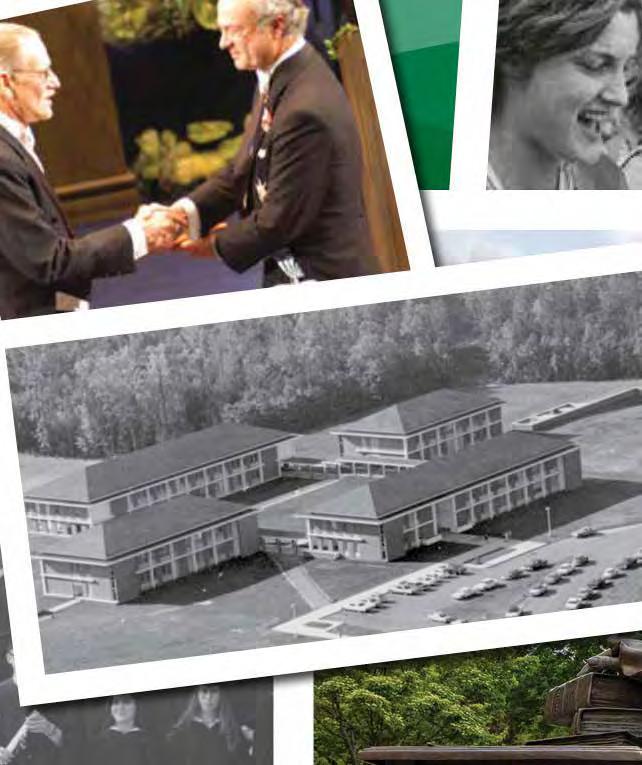
class notes 52 | 50TH.GMU.EDU


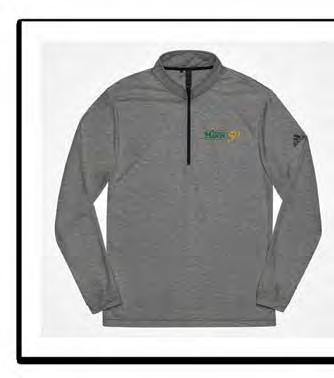
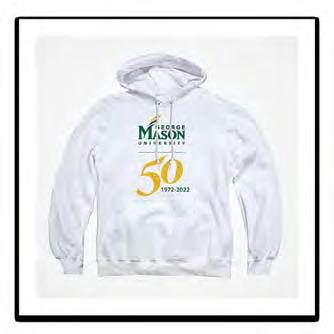





IT’S MASON’S TIME. FIND A GIFT FOR YOURSELF OR OTHERS AND SHOW YOUR MASON PRIDE! We are celebrating Mason’s first 50 years as an independent university by featuring a limited-time line of merchandise offering commemorative 50th Anniversary logos and designs. The collection includes t-shirts, glassware, home furnishings, and more! The entire collection is available in stores or online from the following retailers. SHOP NOW: TRADEMARKS.GMU.EDU/50TH Campus Bookstore College Thread College Thread My HaberdasherAmazon M. LaHart & Co. M. LaHart & Co.

 BLENDING WORLDS—At the Enslaved People of George Mason Memorial dedication, Mason history professor Gabrielle Tayac, a member of the Piscataway Indian Nation, performed a traditional Native American Water Ceremony that added water taken from the Potomac River near Gunston Hall (pictured below, left, with Mason faculty member Wendi Manuel-Scott) into the Wilkins Plaza fountain. Photos by Evan Cantwell
4400 University Drive, MS 3B3 Fairfax, Virginia 22030
BLENDING WORLDS—At the Enslaved People of George Mason Memorial dedication, Mason history professor Gabrielle Tayac, a member of the Piscataway Indian Nation, performed a traditional Native American Water Ceremony that added water taken from the Potomac River near Gunston Hall (pictured below, left, with Mason faculty member Wendi Manuel-Scott) into the Wilkins Plaza fountain. Photos by Evan Cantwell
4400 University Drive, MS 3B3 Fairfax, Virginia 22030












































 BY COLLEEN KEARNEY RICH, MFA '95
BY
BY COLLEEN KEARNEY RICH, MFA '95
BY



 PHOTO BY EVAN CANTWELL
PHOTO BY EVAN CANTWELL








 From left, Mason President Gregory Washington, student Amara Zavala, Germanna President Janet Gullickson, and students Michele Adjei-Fah, Grant Davis, and William McDonnell at Germanna's Fredericksburg campus for the launch of the new Mason Academy.
From left, Mason President Gregory Washington, student Amara Zavala, Germanna President Janet Gullickson, and students Michele Adjei-Fah, Grant Davis, and William McDonnell at Germanna's Fredericksburg campus for the launch of the new Mason Academy.













 PHOTO BY CREATIVE SERVICES
PHOTO BY CREATIVE SERVICES

















 Recently published works by Mason alumni
Recently published works by Mason alumni
 PHOTO BY SIERRA GUARD
—Rebecca Kobayashi
PHOTO BY SIERRA GUARD
—Rebecca Kobayashi

















 BLENDING WORLDS—At the Enslaved People of George Mason Memorial dedication, Mason history professor Gabrielle Tayac, a member of the Piscataway Indian Nation, performed a traditional Native American Water Ceremony that added water taken from the Potomac River near Gunston Hall (pictured below, left, with Mason faculty member Wendi Manuel-Scott) into the Wilkins Plaza fountain. Photos by Evan Cantwell
4400 University Drive, MS 3B3 Fairfax, Virginia 22030
BLENDING WORLDS—At the Enslaved People of George Mason Memorial dedication, Mason history professor Gabrielle Tayac, a member of the Piscataway Indian Nation, performed a traditional Native American Water Ceremony that added water taken from the Potomac River near Gunston Hall (pictured below, left, with Mason faculty member Wendi Manuel-Scott) into the Wilkins Plaza fountain. Photos by Evan Cantwell
4400 University Drive, MS 3B3 Fairfax, Virginia 22030
